Michigan Documents
Quitclaim Deed
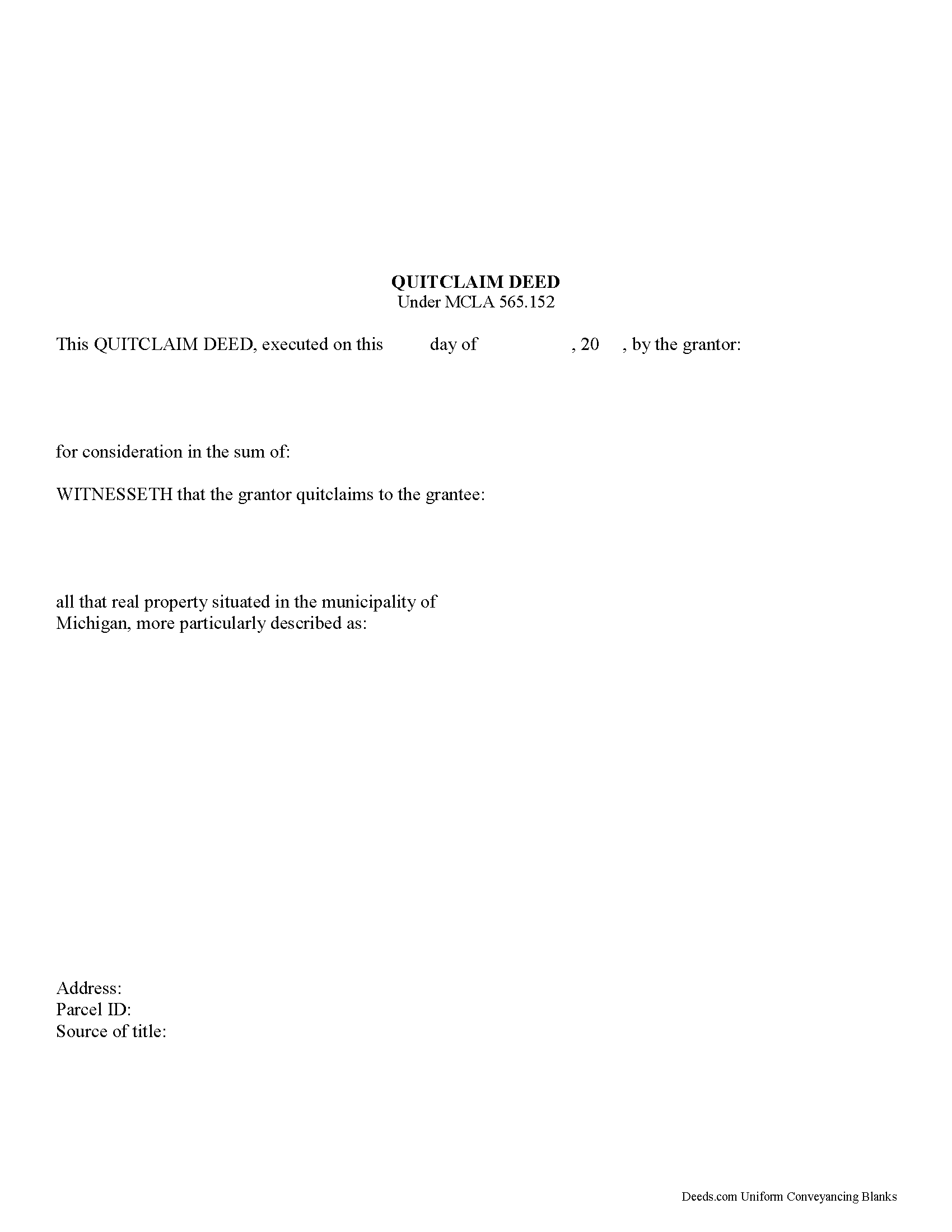
A quitclaim deed in Michigan must be duly signed, sealed, and acknowledged by the grantor in order to operate as a conveyance in fee simple to the grantee, his heirs, and assigns (MCL 565.151). In the words of conveyance, provide a legal description of the real property as well as the consideration exchanged for the property (MCL 565.151). The name and address of the person who prepared the instrument must also be listed on the first page (MCL 565.201a). Section 565.201 of the Michigan Compiled Laws outlines formatting and content requirements for quitclaim deeds executed in the state. Further, it is important to include a statement of the marital status of any male grantors involved in the conveyance. A register of deeds in Michigan can refuse a quitclaim deed for recordation if this information is not provided (MCL 565.221).
The act of recording a quitclaim deed with a register of deeds places it in the public records. An unrecorded quit claim deed is void as against a subsequent purchaser, in good faith and for valuable consideration, of the same real estate whose conveyance is first recorded. The fact that the first recorded deed of the same real estate is a quitclaim deed ... More Information about the Michigan Quitclaim Deed
Lady Bird Quitclaim Deed
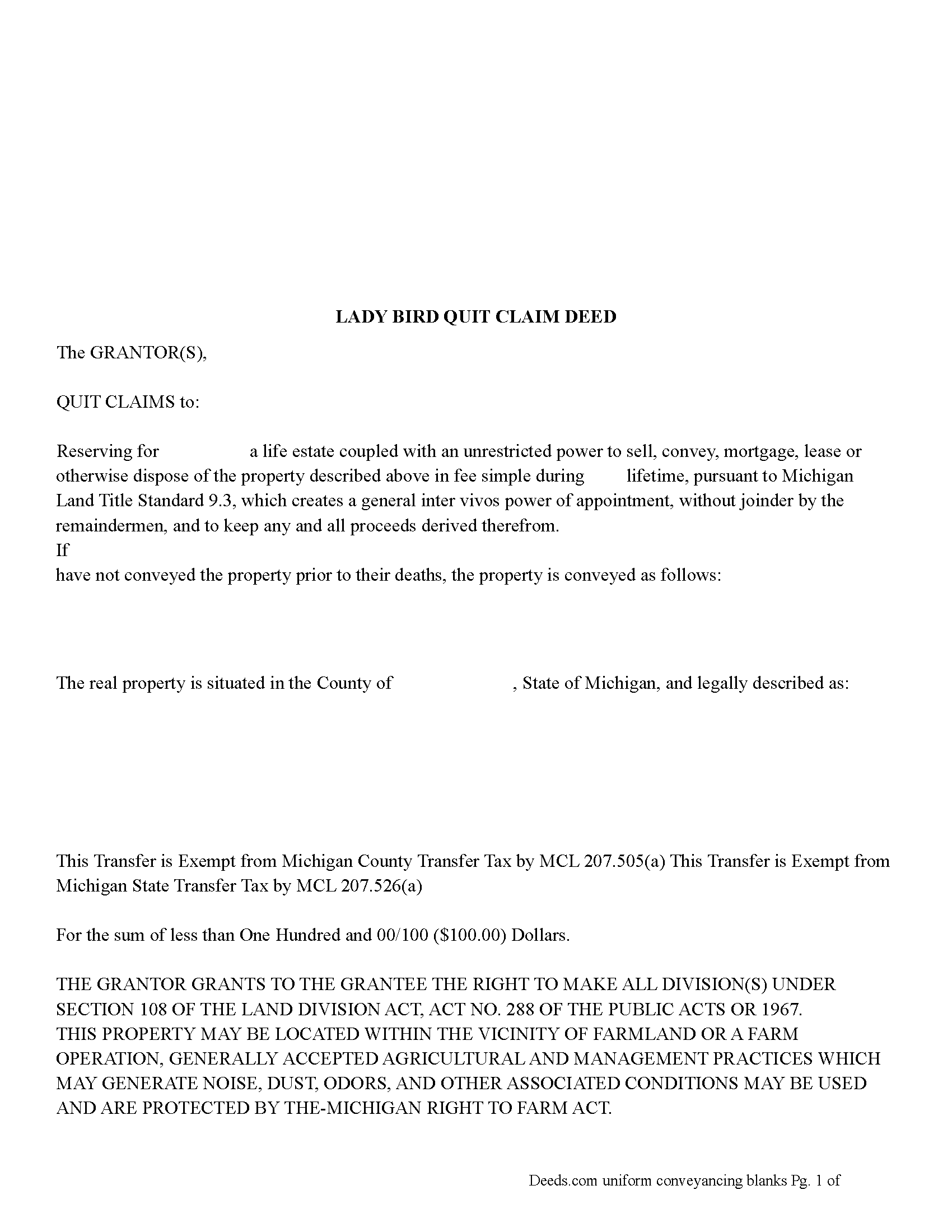
A Michigan lady bird quitclaim deed is based on the statutes regarding power of appointment. According to Michigan Land Standards 6th Edition, Standard 9.3
Michigan Land Title Standards Act 9.3 reads: The holder of a life estate, coupled with an absolute power to dispose of the fee estate by inter vivos conveyance, can convey a fee simple estate during the lifetime of the holder. If the power is not exercised, the gift becomes effective.
In Michigan, a Lady Bird Deed Quitclaim Deed is a type of Quitclaim Deed that allows the Grantor, to transfer their property upon their death to a named beneficiary. This is a great tool for estate planning and helps to avoid probate court. These courts deal with someone's assets and belongings after they pass away. Going through this court is typically expensive and time-consuming.
As long as the Grantor lives, he/she/they are free to sell the property to someone else, give the property away as a gift, encumber the property with mortgages and liens, rent the property to tenants, and even execute a brand-new ladybird deed defeating Grantee's contingent interest in favor of someone else. Grantee(s) does/do not have any tangible rights to th... More Information about the Michigan Lady Bird Quitclaim Deed
Gift Deed
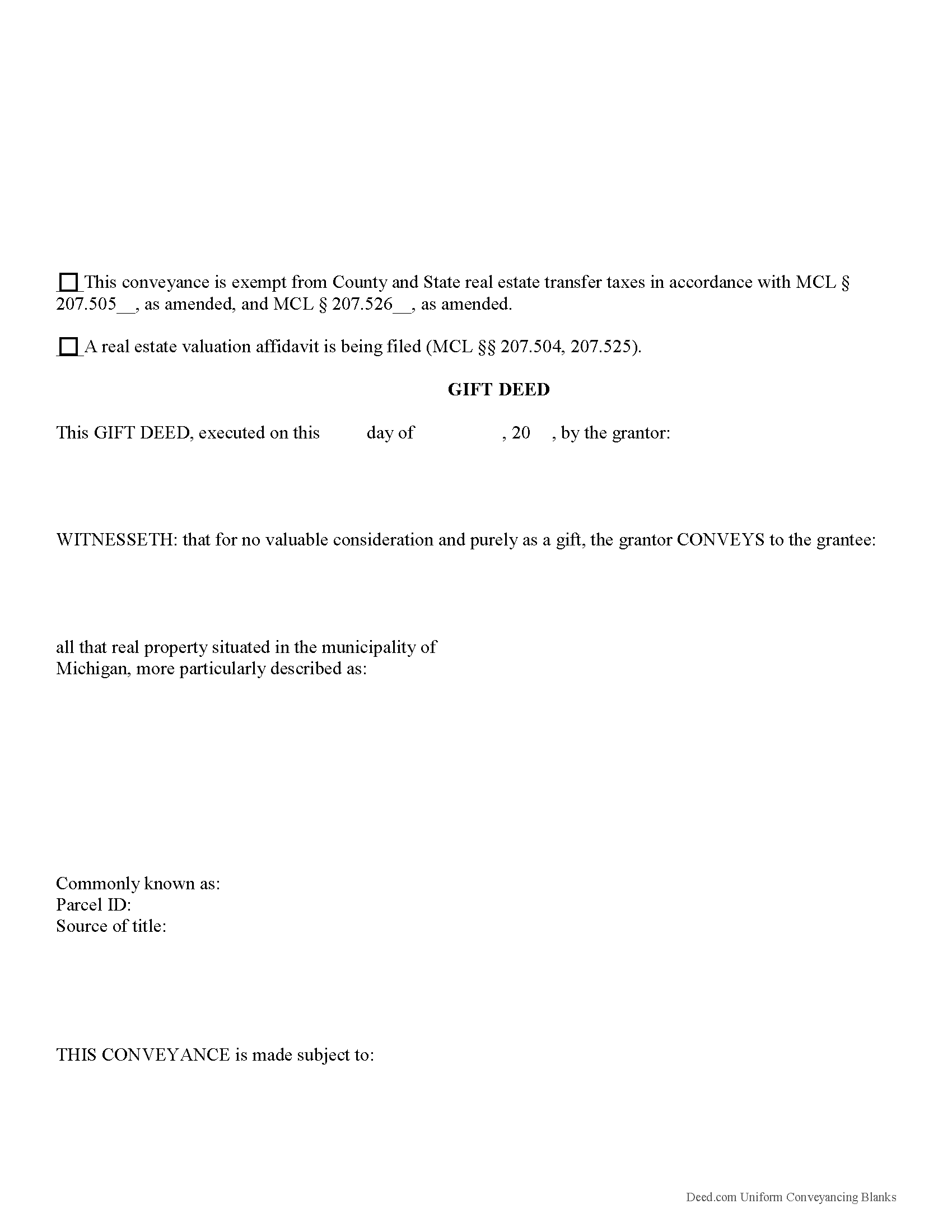
Gifts of Real Property (Real Estate) in Michigan
A gift deed, or deed of gift, is a legal document voluntarily transferring title to real property from one party (the grantor or donor) to another (the grantee or donee). A gift deed typically transfers real property between family or close friends. Gift deeds are also used to donate to a non-profit organization or charity. The deed serves as proof that the transfer is indeed a gift and without consideration (any conditions or form of compensation).
Valid deeds must meet the following requirements: The grantor must intend to make a present gift of the property, the grantor must deliver the property to the grantee, and the grantee must accept the gift. Gift deeds must contain language that explicitly states no consideration is expected or required, because any ambiguity or reference to consideration can make the deed contestable in court. A promise to transfer ownership in the future is not a gift, and any deed that does not immediately transfer the interest in the property, or meet any of the aforementioned requirements, can be revoked [1].
A lawful gift deed must also include the grantor's full name and marital status, a... More Information about the Michigan Gift Deed
Warranty Deed
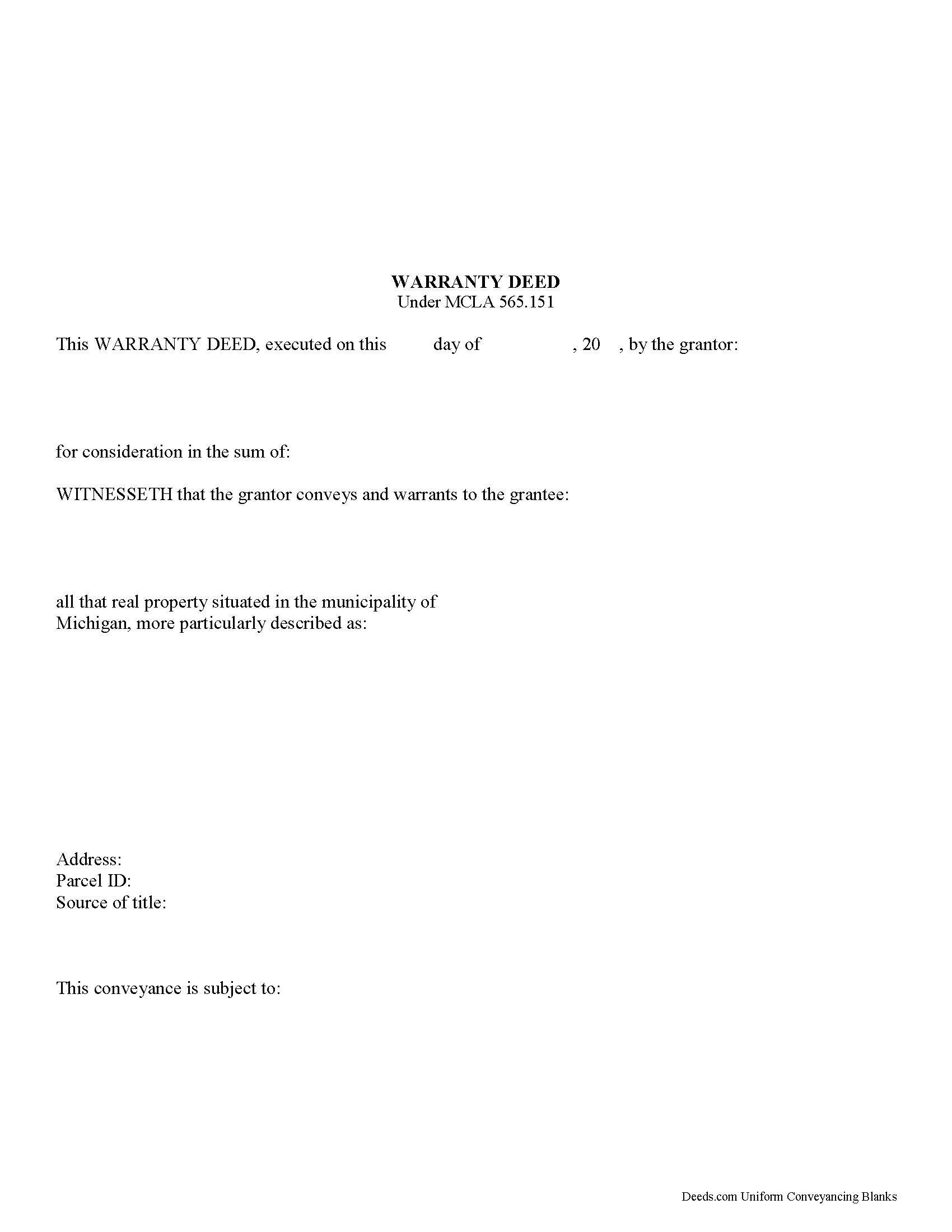
Real estate in Michigan can be transferred by purchase, by will, by inheritance, through adverse possession, or by eminent domain. A real estate deed, specifically a warranty deed, is the most common way to transfer title to real property in this state. A warranty deed that has been dated, duly signed, and acknowledged by the grantor is a conveyance in fee simple to the grantee, his heirs, and assigns, with covenants from the grantor that (1) he is lawfully seized of the premises, has good right to convey the premises, and guarantees the quiet possession thereof; (2) that the premises are free from all encumbrances; and (3) that the grantor will defend the title to the premises against all lawful claims (565.151). The warranty deed is used often in Michigan, as this state does not technically allow limited warranty deeds, according to section 750.275 of the Michigan Revised Statutes.
A warranty deed should be dated, duly signed by the grantor, and acknowledged. Warranty deeds executed in Michigan can be acknowledged before any judge, clerk of a court of record, or notary public within the state. The officer taking the acknowledgment should endorse a certificate of acknowledgme... More Information about the Michigan Warranty Deed
Special Warranty Deed
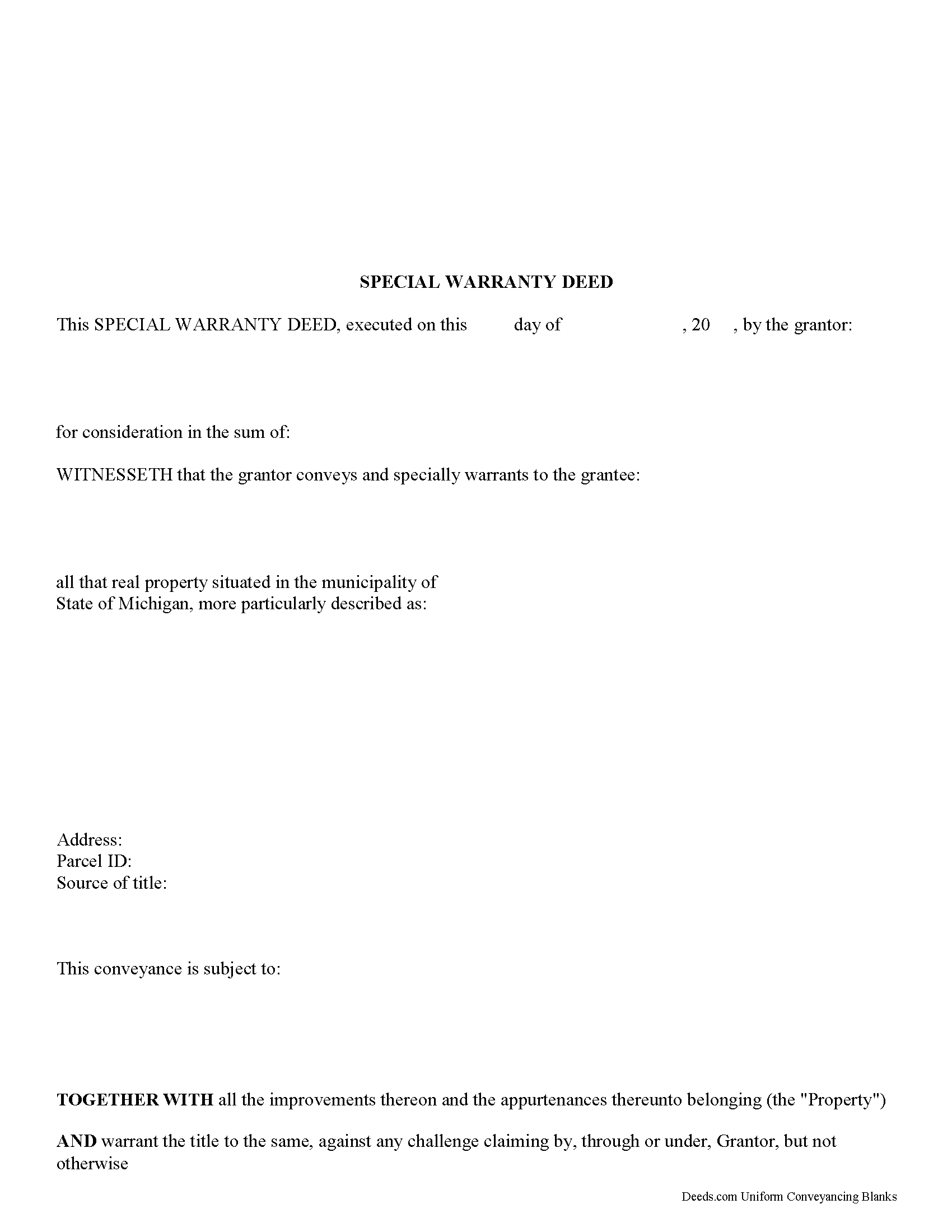
Special or limited warranty deeds, or at least the forms for such deeds, are not able to be used in Michigan, according to MCL 750.275: "Any person who shall print, sell or keep for sale any blank forms of deeds containing the words 'warranty deed' or 'warranty-deed covenant-own-acts,' or any similar words printed or written thereon, unless such deed is in fact an absolute warranty deed, and any person who shall knowingly use any such deed for the purpose of conveying title unless the same is an absolute warranty shall be guilty of a misdemeanor."
Instead, a covenant deed (sometimes called a Deed C) can be used in the place of a special warranty deed. In a covenant deed, the grantor's warranty is limited to claims arising from the actions of the grantor.
A covenant deed should be dated, duly signed by the grantor, and acknowledged. A deed executed in Michigan can be acknowledged before any judge, clerk of a court of record, or notary public within the state. The officer taking the acknowledgment should endorse a certificate of acknowledgment on the deed (565.8). A covenant deed executed out of state and according to the laws of such state can be acknowledged before a judge... More Information about the Michigan Special Warranty Deed
Grant Deed
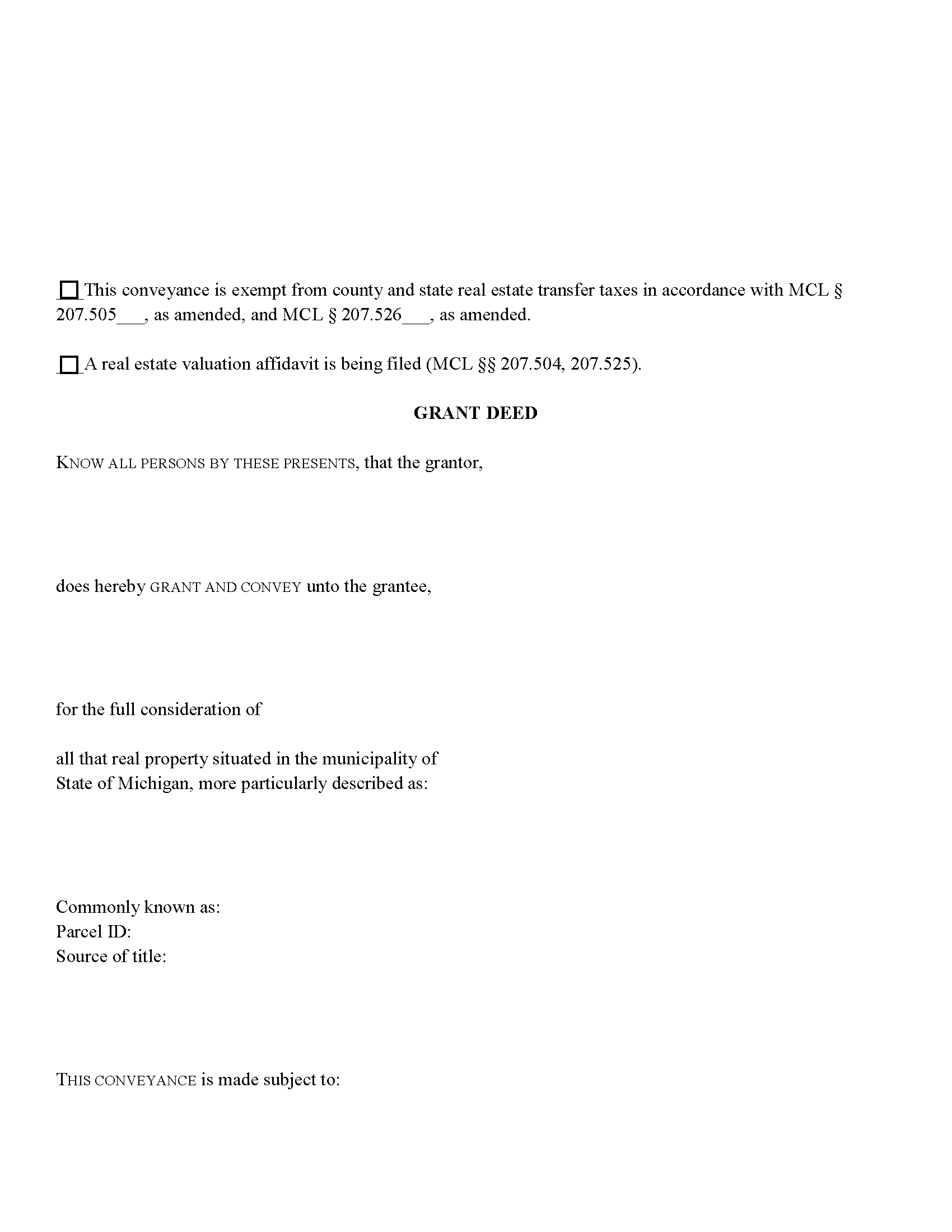
Real property conveyances are governed by Chapter 565 of the Michigan Legislature, but grant deeds are not statutory forms in Michigan.
Grant deeds convey property from the grantor (generally the owner) to the grantee (generally the purchaser), with the guarantee that the grantor has not previously sold the real property interest being conveyed to the grantee, and that the property is without any liens or encumbrances, except for those specified in the deed.
Compared to a statutory warranty deed, grant deeds offer less protection to the grantee as they do not require the grantor to defend the title claims. However, they still offer more protection than a statutory quitclaim deed, guaranteeing that the owner does have a valid ownership interest in the property.
In addition to meeting all state and local standards for recorded documents, a lawful deed must include the grantor's full name and marital status, as well as the grantee's name, marital status, address, and vesting (MCL 565.201). Vesting describes how the grantee holds title to the property. For Michigan residential property, the primary methods for holding title are tenancy in common, joint tenancy, and tenancy by ... More Information about the Michigan Grant Deed
Correction Deed
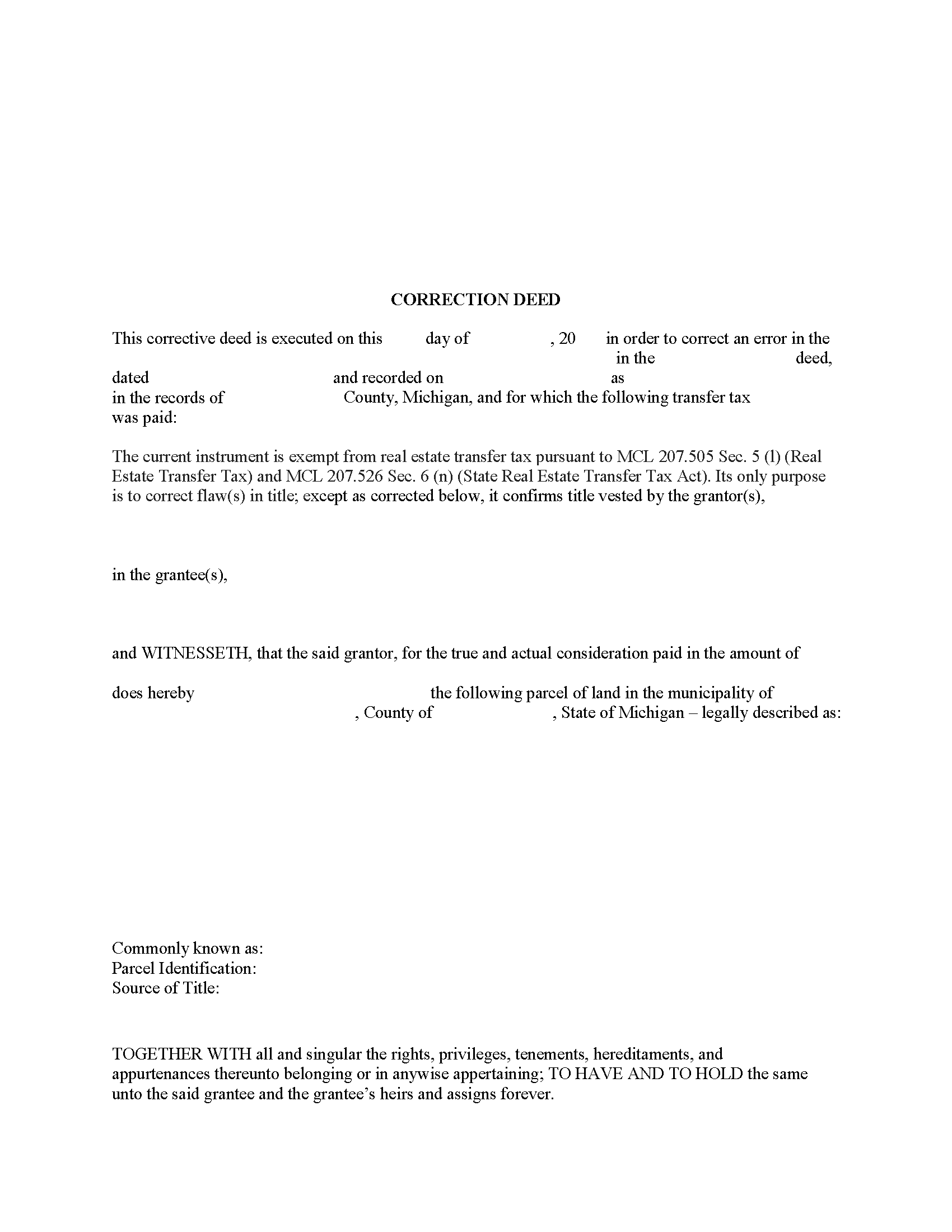
Use this correction deed to correct an error in a previously executed and recorded deed.
Correction deeds are used to adjust the earlier deed when that document contains minor errors of omission or typographical errors, sometimes called scrivener's mistakes. For example, a misspelled name, an omitted or wrong middle initial, a minor error in the property description, or an omitted execution date. Do not us the correction deed for more substantial changes, such as the removal of a name from a deed. Such alterations are better handled through a quit claim deed.
The correction deed, also called corrective deed, must state that its sole purpose is to correct a specific error, which is usually identified by type. For example: an error in the grantor's name, or an error in the grantor's marital status. It also must clearly reference the type of document it is correcting and state the execution and recording date of that prior document, as well as the number under which it was recorded, either referred to as instrument number or liber (book) and page number.
In subsequent sections, the correction deed repeats the information that was in the prior deed with the exception of the fa... More Information about the Michigan Correction Deed
Easement Deed
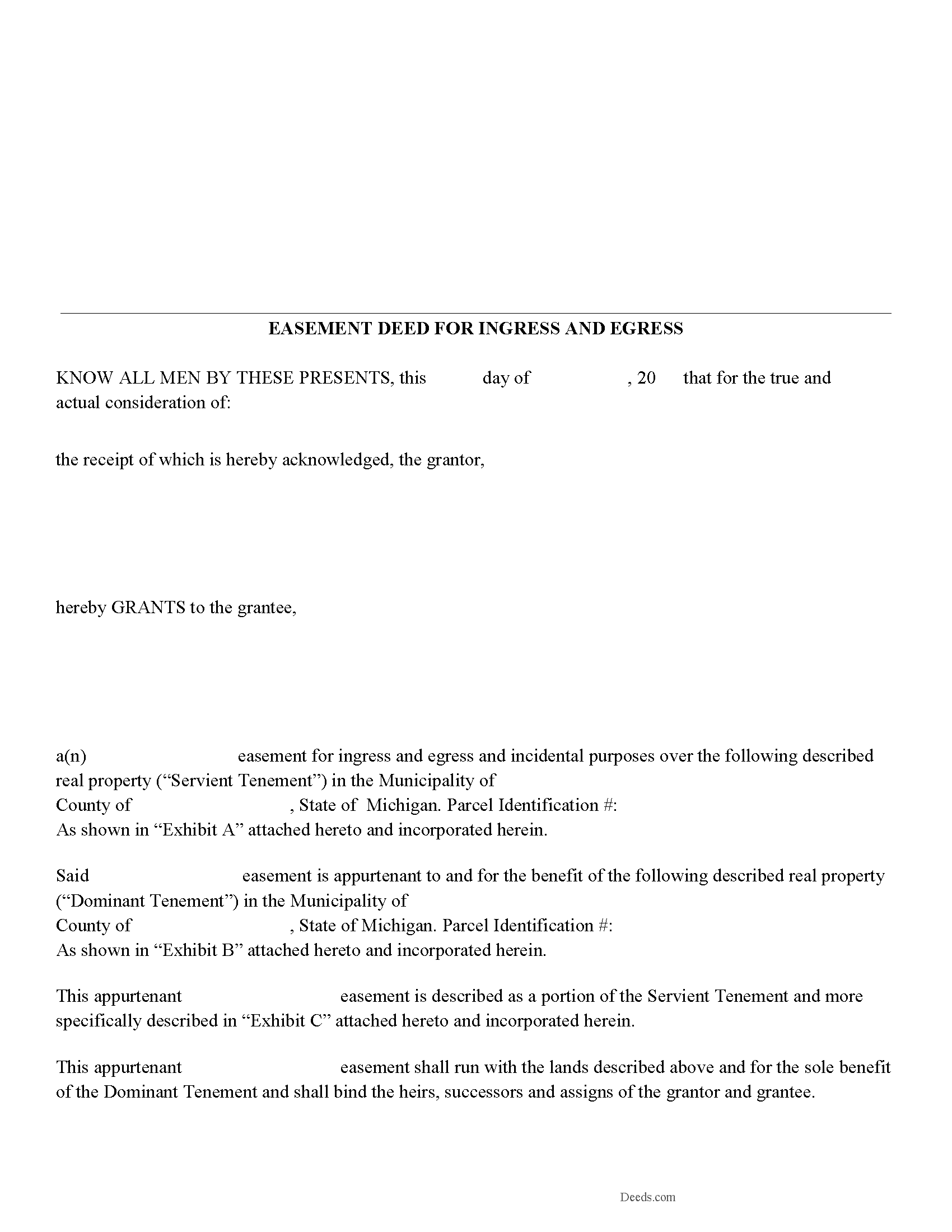
An easement is an interest in real estate that gives one person the right to use someone else's land for a specific purpose. The focus of an easement is on usage, not on ownership. There are two types of easements: an easement appurtenant and an easement in gross. Further, easements can be affirmative or negative. An appurtenant easement benefits the dominant estate and runs with the land when the property is transferred. An easement in gross benefits an individual or a legal entity. An easement in Michigan is generally created by a deed in writing or by operation of law. The easement deed should specify the terms and conditions of the easement itself.
As an interest in real property, an easement deed in Michigan must be signed, dated, and acknowledged by the grantor. If an easement deed is executed in Michigan, it can be acknowledged before a judge, clerk of a court of record, or notary public within the state and should be endorsed with a certificate of acknowledgment by the officer taking acknowledgments (565.8). Michigan adheres to the uniform recognition of acknowledgments act, which means that an instrument acknowledged out of state can be recorded in Michigan if the inst... More Information about the Michigan Easement Deed
Termination of Easement
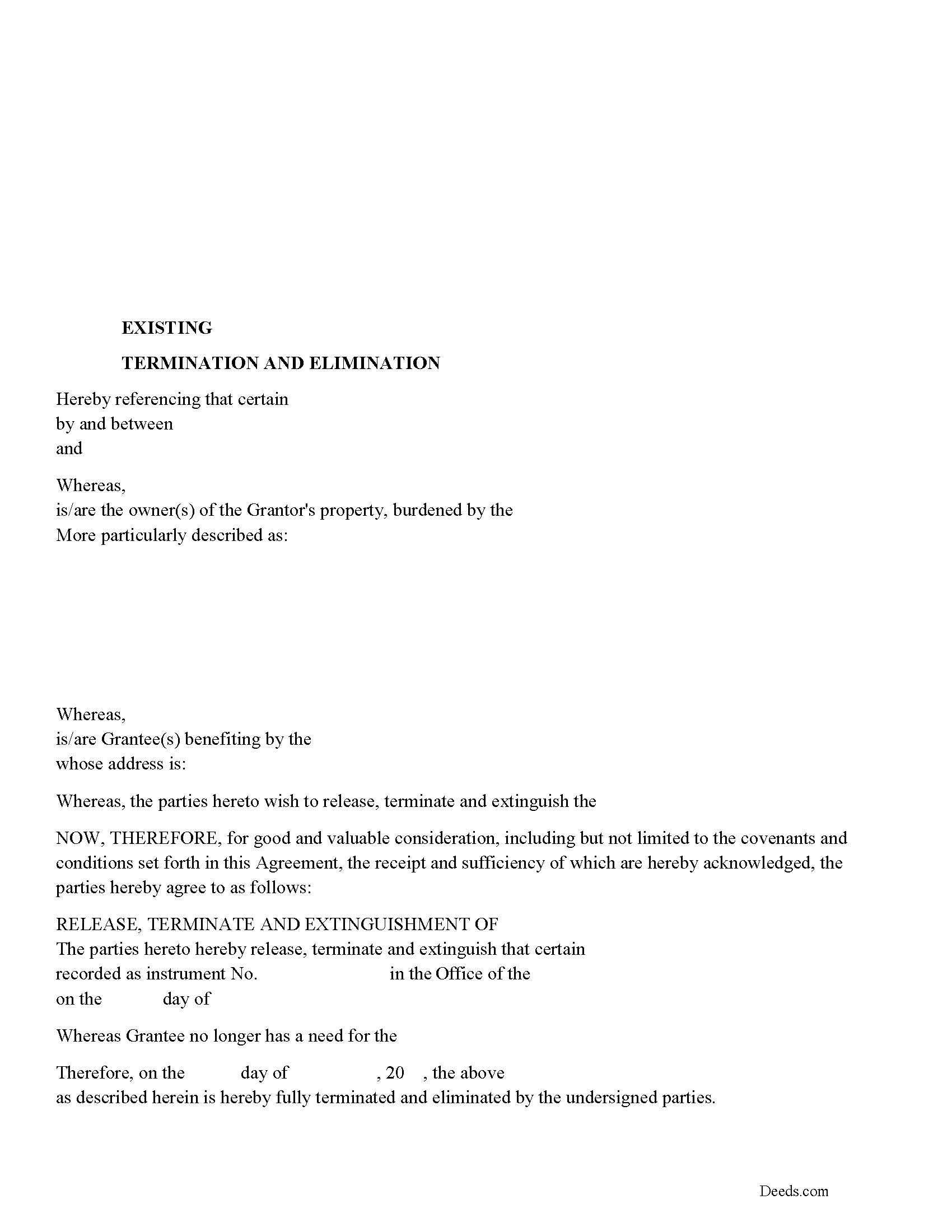
Use this form to release, terminate, extinguish a previously recorded document that involves access to and from a property.
Documents such as:
1. Easement Deeds or Agreements (An easement is a non-possessory interest in land, granting the right to use someone else's property for a specific purpose, like a driveway or utility line)
2. Access Roads
3. Right of Ways
4. Utility Easements (Power, Gas, Water, Sewer, Etc.)
5. Drainage Easements
This document allows the owner of the land, burdened by the access and the party that benefits from the access, to sign an agreement releasing the property from such access, ... More Information about the Michigan Termination of Easement
Warranty Deed with Enhanced Life Estate
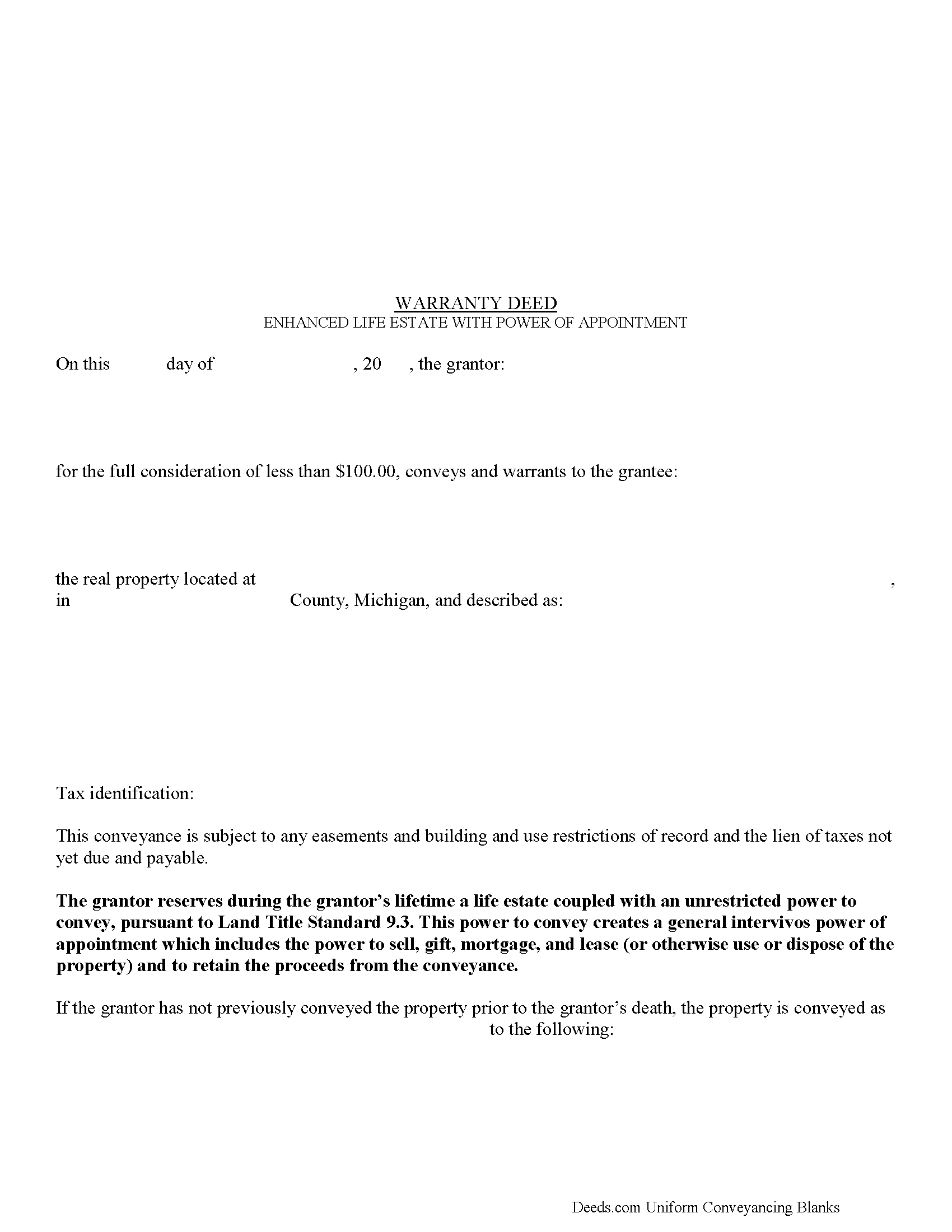
A warranty deed with enhanced life estate is sometimes referred to as a ladybird deed. When correctly executed and recorded, this deed provides the structure for a non-testamentary transfer of real property. Leaving the real property out of a will allows the transfer to occur without the need for probate.
The grantor conveys the real estate back to herself, but reserves a life estate with full power to sell, mortgage, change the beneficiary, or otherwise use the property with no penalty for waste or obligation to inform the beneficiary. When the grantor dies, the property rights, if still available, transfer to the default beneficiary.
To finalize the conveyance, the beneficiary must file a property transfer affidavit within 45 days of the grantor's death. Submit the form to the assessor's office located in the same county as the real estate.
(Michigan WD with Enhanced Life Estate Package includes form, guidelines, and completed example)... More Information about the Michigan Warranty Deed with Enhanced Life Estate
Mortgage Secured by Promissory Note
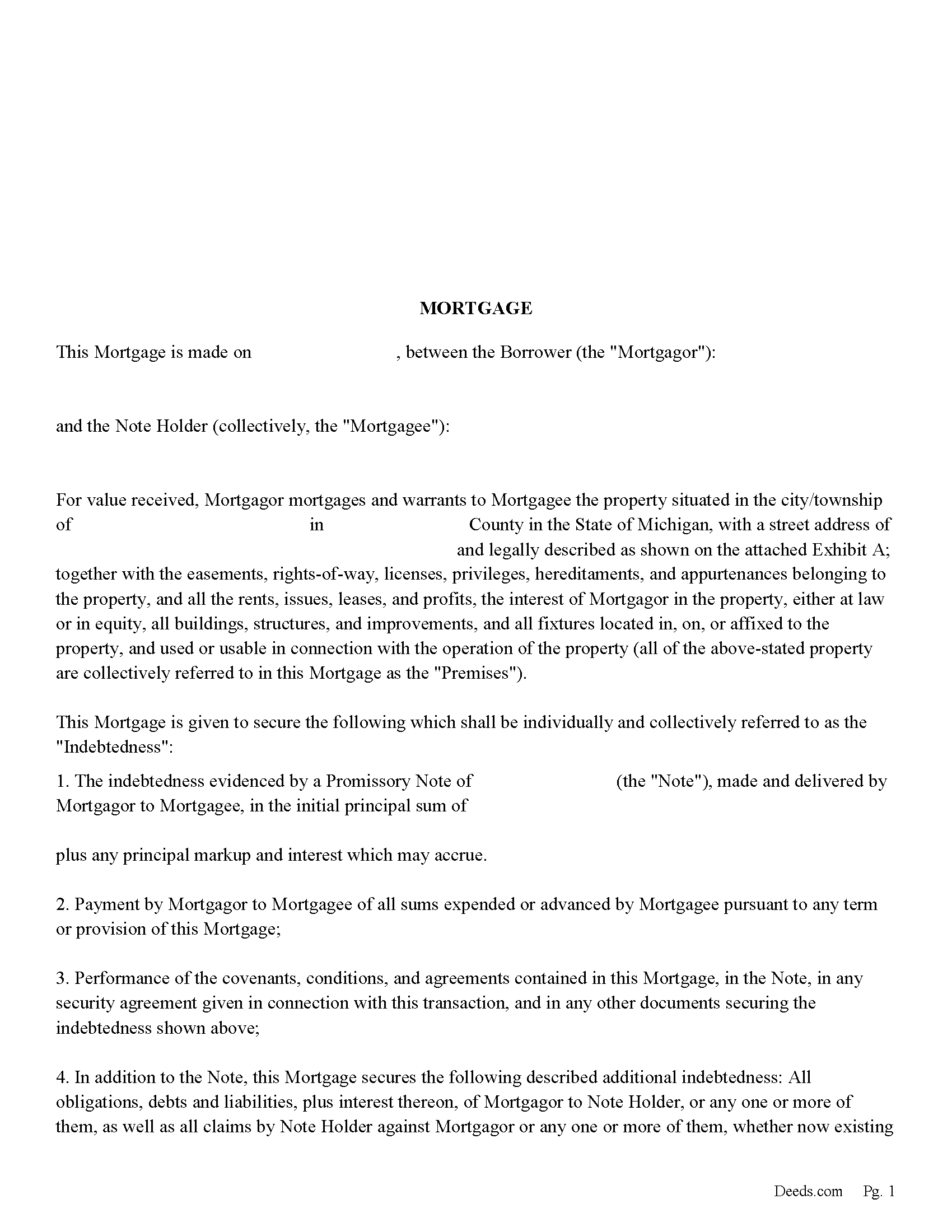
This mortgage includes a power of sale clause and waiver of rights, saving time and expense in the case of a foreclosure.
Waiver of Rights. This Mortgage contains a power of sale that permits the Mortgagee/Lender to cause the Premises to be sold in the event of a default. Mortgagee/Lender may elect to cause the Premises to be sold by advertisement rather than pursuant to court action, and Mortgagor/Borrower voluntarily and knowingly waives any right Mortgagor/Borrower may have by virtue of any applicable constitutional provision or statute to any notice or court hearing before the exercise required by the Michigan statute governing foreclosures by advertisement.
In the event of default in any of the terms or covenants of this Mortgage, Mortgagee/Lender shall be entitled to all of the rights and benefits of MCL 554.231-.233, MSA 26.1137(1)-(3), and 1966 PA 151.
Use this mortgage to finance residential property, small commercial, condominiums, rental property, and planned unit developments even with an existing first mortgage on the subject property. A mortgage and promissory note that include stringent default terms can be beneficial to the Mortgagee/Lender.
Included is a... More Information about the Michigan Mortgage Secured by Promissory Note
Mortgage Subordination
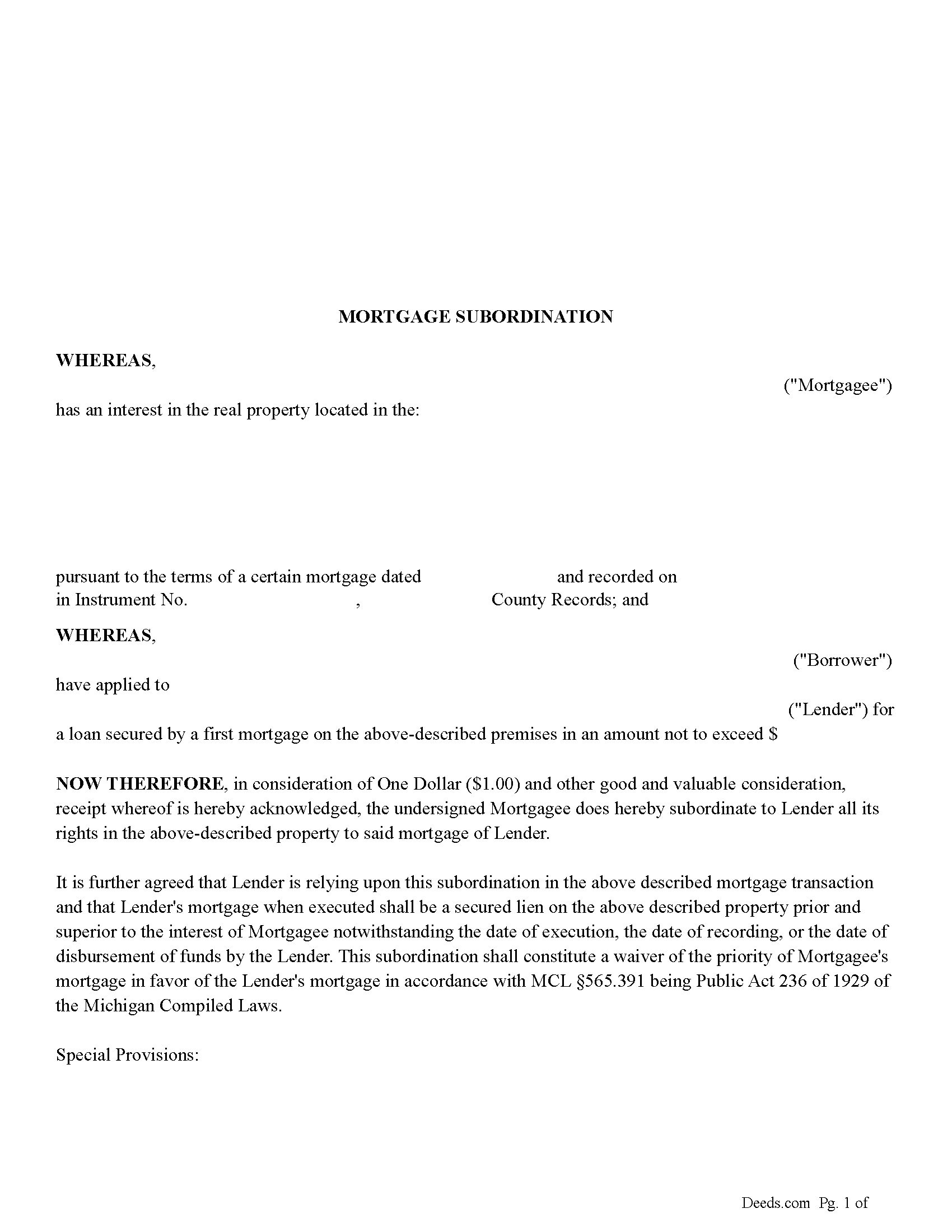
This form is executed by the current mortgagee named in the mortgage to (waive the priority of the mortgage in favor of another)(mortgage by executing a separate instrument acknowledged in the same manner as required for deeds and other instruments for the transfer of an interest in real estate. The waiver is effective to the extent of the mortgage waived.) When recorded (the waiver is constructive notice of the waiver to all persons dealing with the mortgage or with property described in the mortgage from the date the waiver is recorded.) (565.391 Sec.1)
(Michigan MS Package includes form, guidelines, and completed example) For use in Michigan only.... More Information about the Michigan Mortgage Subordination
Assignment of Mortgage
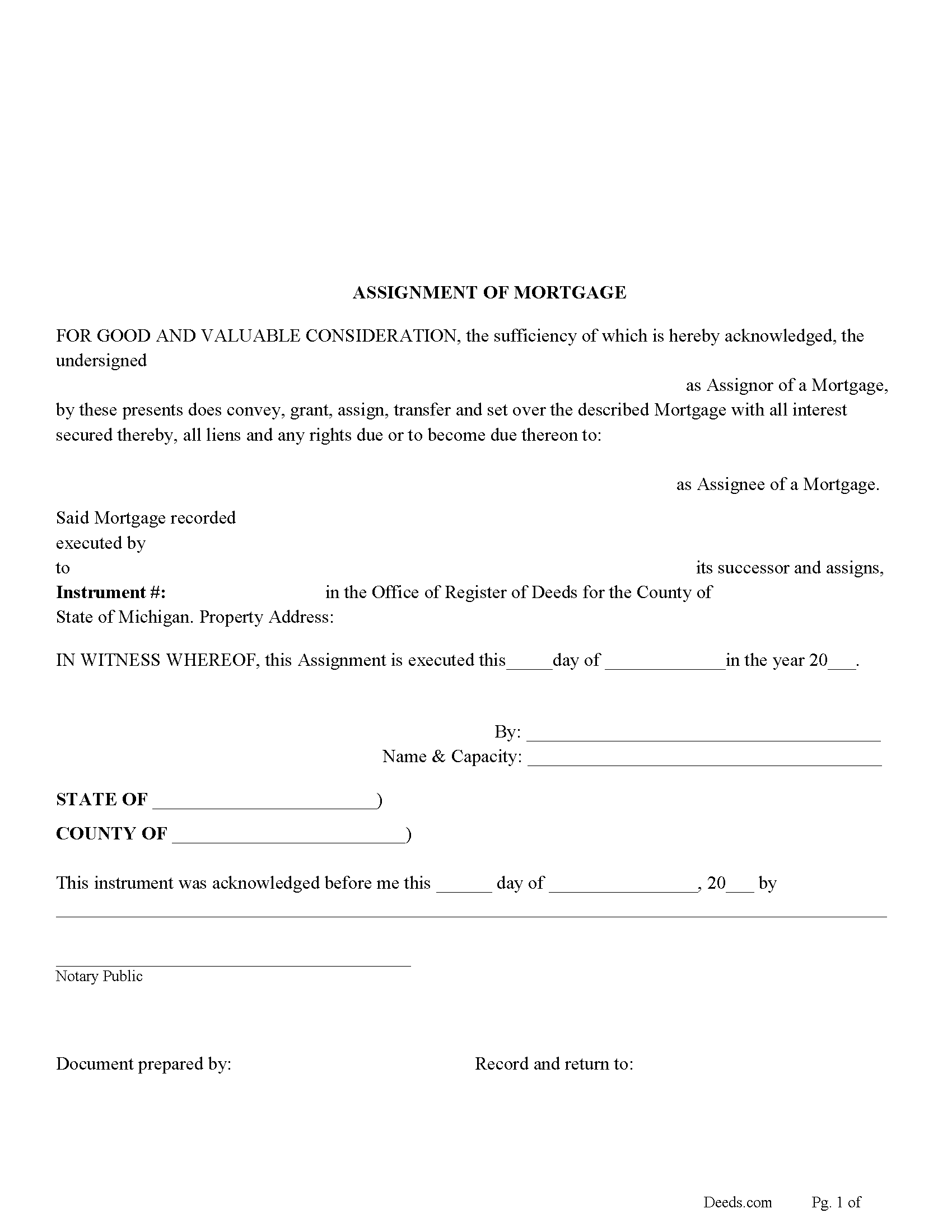
This form is used by the current lender to assign an existing mortgage to another person or entity.
565.33 Assignment of mortgage; effect of recording.
Sec. 33.
The recording of an assignment of a mortgage shall not, in itself, be deemed notice of such assignment to the mortgagor, his heirs or personal representatives, so as to invalidate any payment made by them, or either of them to the mortgagee.
(Michigan AOM Package includes form, guidelines, and completed example) for use in Michigan only.
... More Information about the Michigan Assignment of Mortgage
Discharge of Mortgage
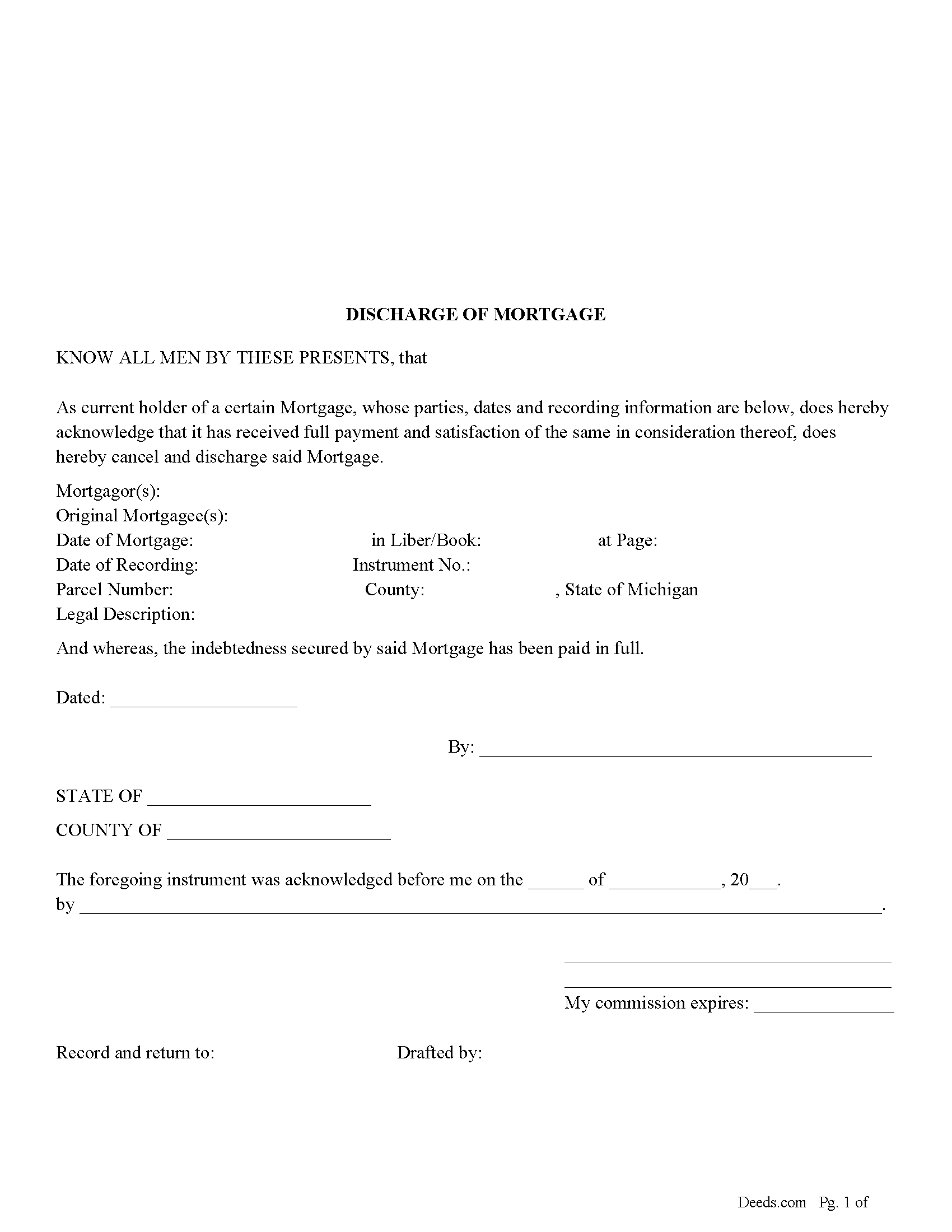
This form is used by the (mortgagee or the personal representative, successor, or assign of the mortgagee), who (shall prepare a discharge of the mortgage, file the discharge with the register of deeds for the county where the mortgaged property is located, and pay the fee for recording the discharge.) (565.41 Sec. 41(1)) A mortgagee is often referred to as a lender. For use when an indebtedness secured by said Mortgage has been paid in full. A "discharge of mortgage" is often referred to a "satisfaction of mortgage".
To avoid liability and penalty (the discharge of mortgage, execution and acknowledgment of a certificate, or filing of a discharge of mortgage required by this section or section 41 shall be performed within whichever of the following time periods is applicable:
(a) For the first 2 years after the effective date of the amendatory act that added this subsection, 75 days.
(b) Beginning 2 years after the effective date of the amendatory act that added this subsection, 60 days.) (565.44 Sec. 44(2))
This form is also used to discharge a Land Contract.
565.361 Payment and performance of contract obligations; conveyance of land; discharge of land contract mortgage... More Information about the Michigan Discharge of Mortgage
Partial Discharge of Mortgage
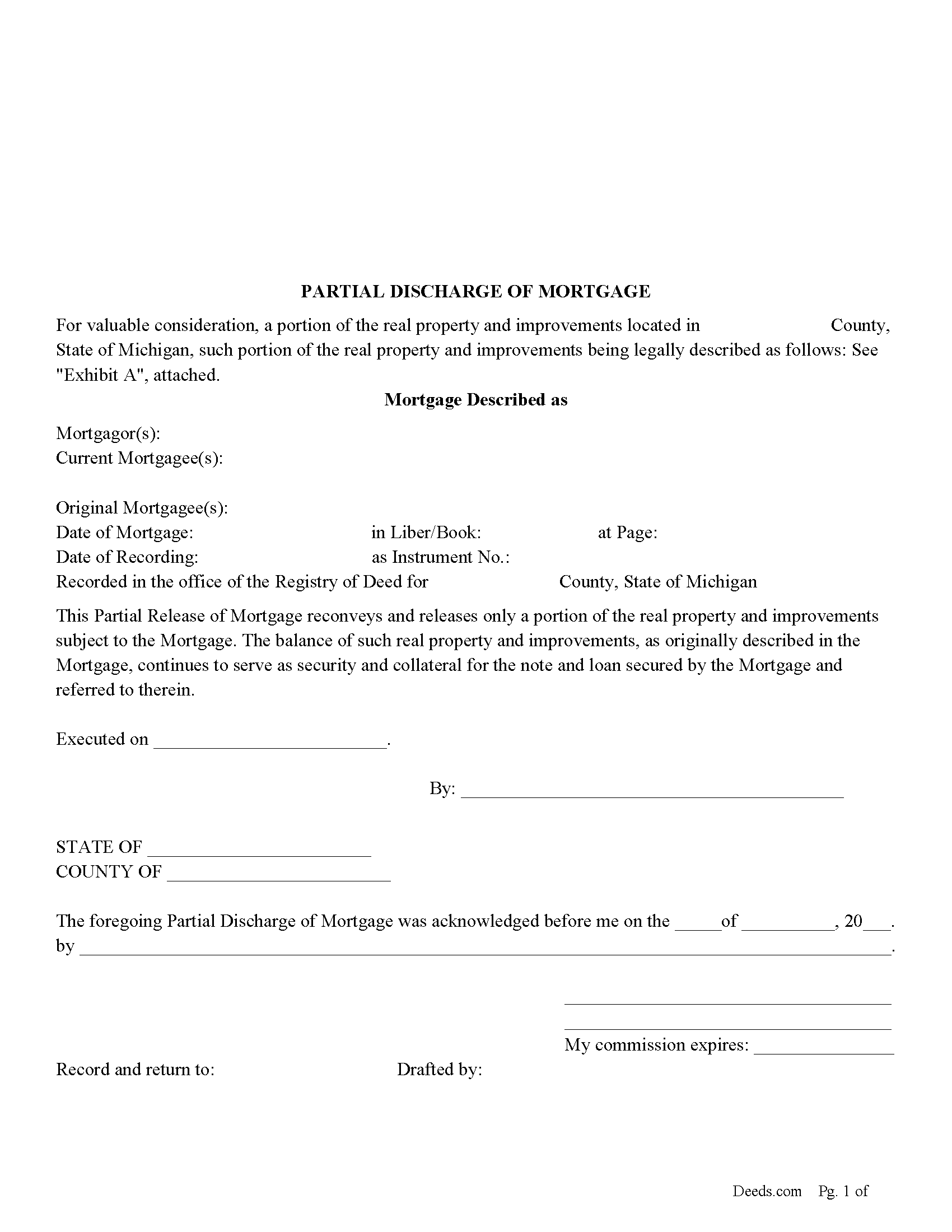
Use this form to release a portion of property secured by a mortgage and promissory note. Example: borrower has financed 5 lots for $100,000.00 which has since been paid down to a balance of $30,000.00. Borrower approaches Lender and would like the lender to release lot #3 because he has it sold. The lender might think, ok - he will owe me $30,000.00 on the remaining 4 lots, I consider this a good risk. The same can also be applicable to condominiums, apartments, parcels, etc.
This form is used by the (mortgagee or the personal representative, successor, or assign of the mortgagee), who (shall prepare a discharge of the mortgage, file the discharge with the register of deeds for the county where the mortgaged property is located, and pay the fee for recording the discharge.) (565.41 Sec. 41(1)) A mortgagee is often referred to as a lender.
(Michigan PDOM Package includes form, guidelines, and completed example)
... More Information about the Michigan Partial Discharge of Mortgage
Assignment of Leases and Rents
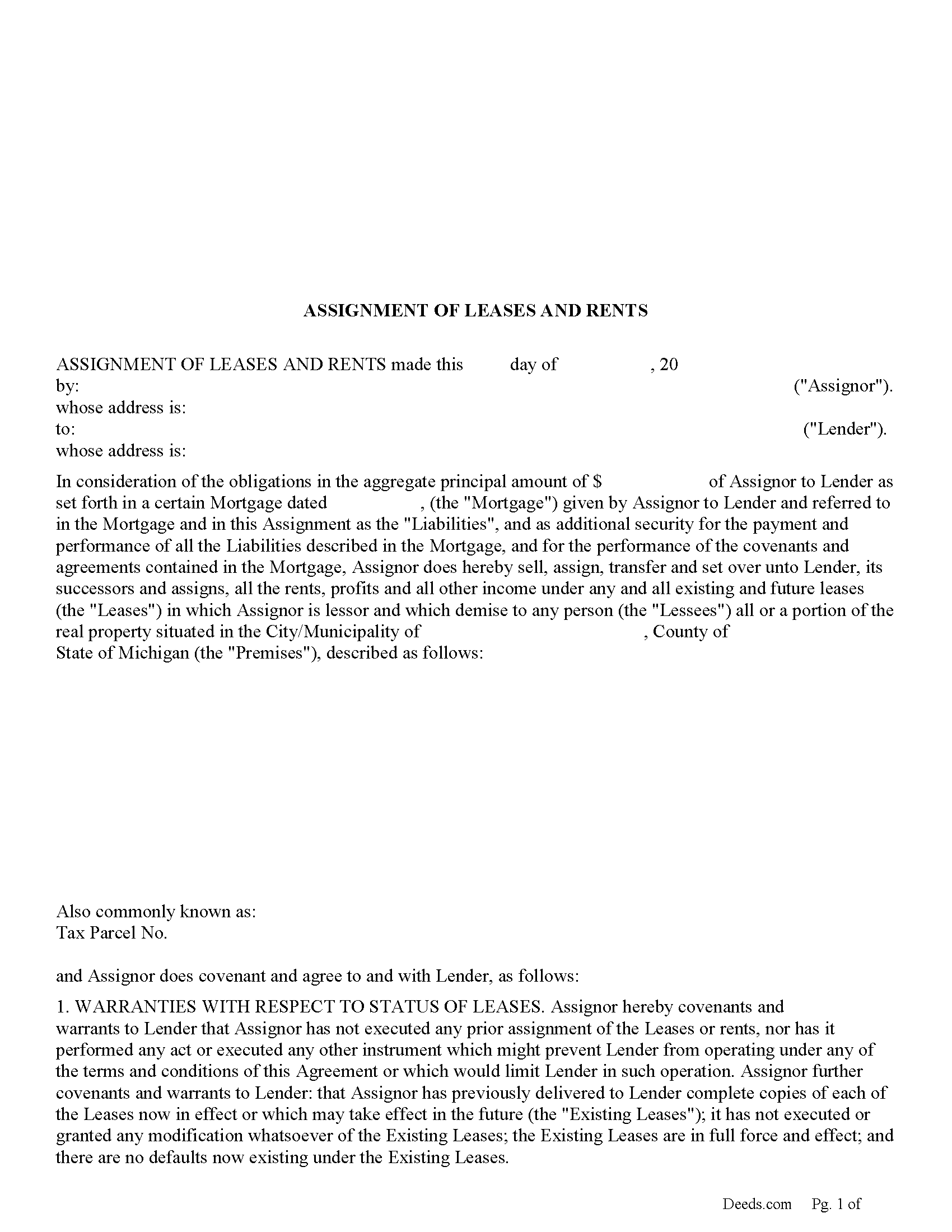
Use this form to assign leases and rents to the lender as added security in the case of default.
554.231 Assignment of rents to accrue from leases as additional mortgage security.
Sec. 1.
Hereafter, in or in connection with any mortgage on commercial or industrial property other than an apartment building with less than 6 apartments or any family residence to secure notes, bonds or other fixed obligations, it shall be lawful to assign the rents, or any portion thereof, under any oral or written leases upon the mortgaged property to the mortgagee, as security in addition to the property described in such mortgage. Such assignment of rents shall be binding upon such assignor only in the event of default in the terms and conditions of said mortgage, and shall operate against and be binding upon the occupiers of the premises from the date of filing by the mortgagee in the office of the register of deeds for the county in which the property is located of a notice of default in the terms and conditions of the mortgage and service of a copy of such notice upon the occupiers of the mortgaged premises.
(Michigan AOR Package includes form, guidelines, and completed example)... More Information about the Michigan Assignment of Leases and Rents
Discharge of Assignment of Leases and Rents
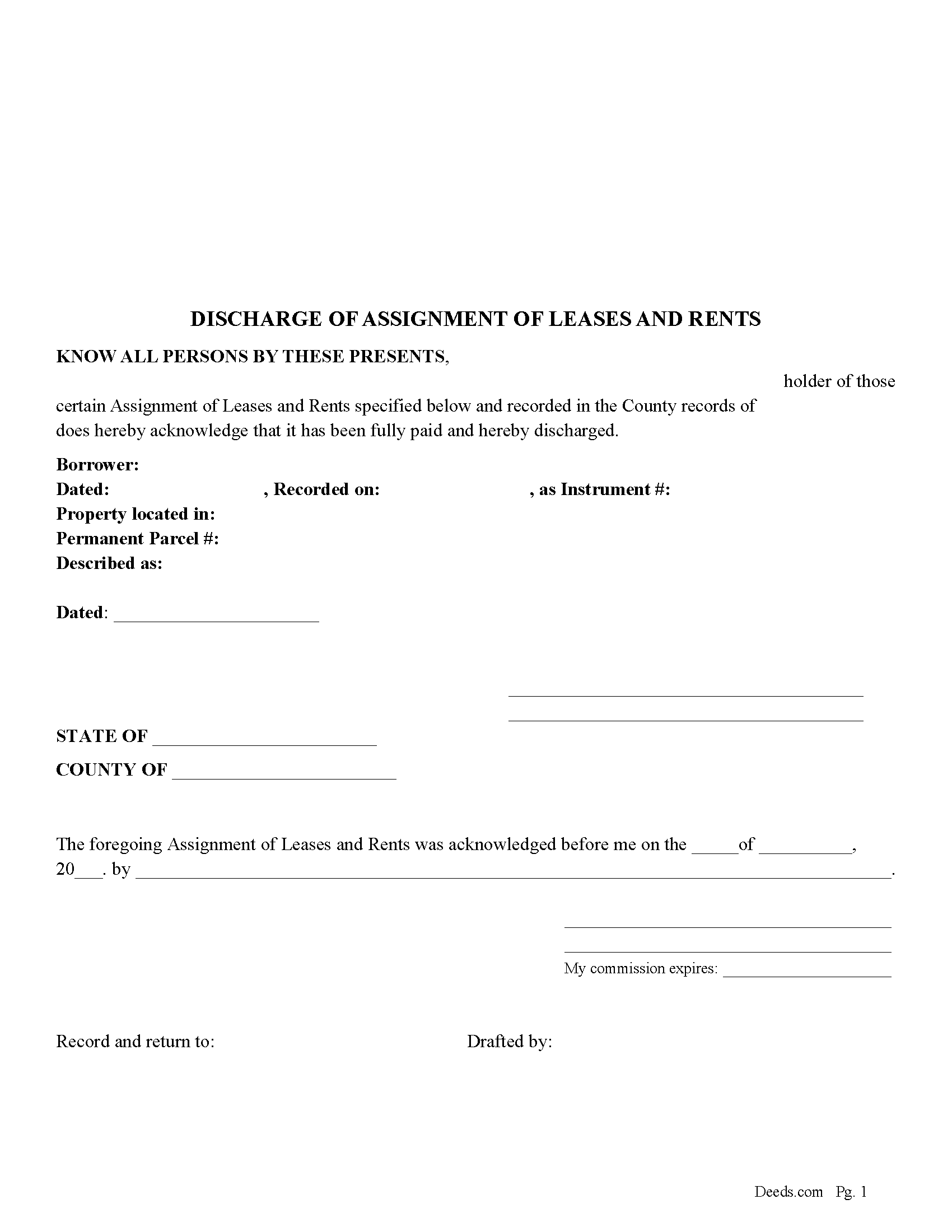
Use this form to discharge a previously recorded "Assignment of Rents and Leases" stating the fact that it has been fully paid and hereby discharged.
For use in Michigan only.
(Michigan Discharge of AOR Package includes form, guidelines, and completed example)
... More Information about the Michigan Discharge of Assignment of Leases and Rents
Land Contract
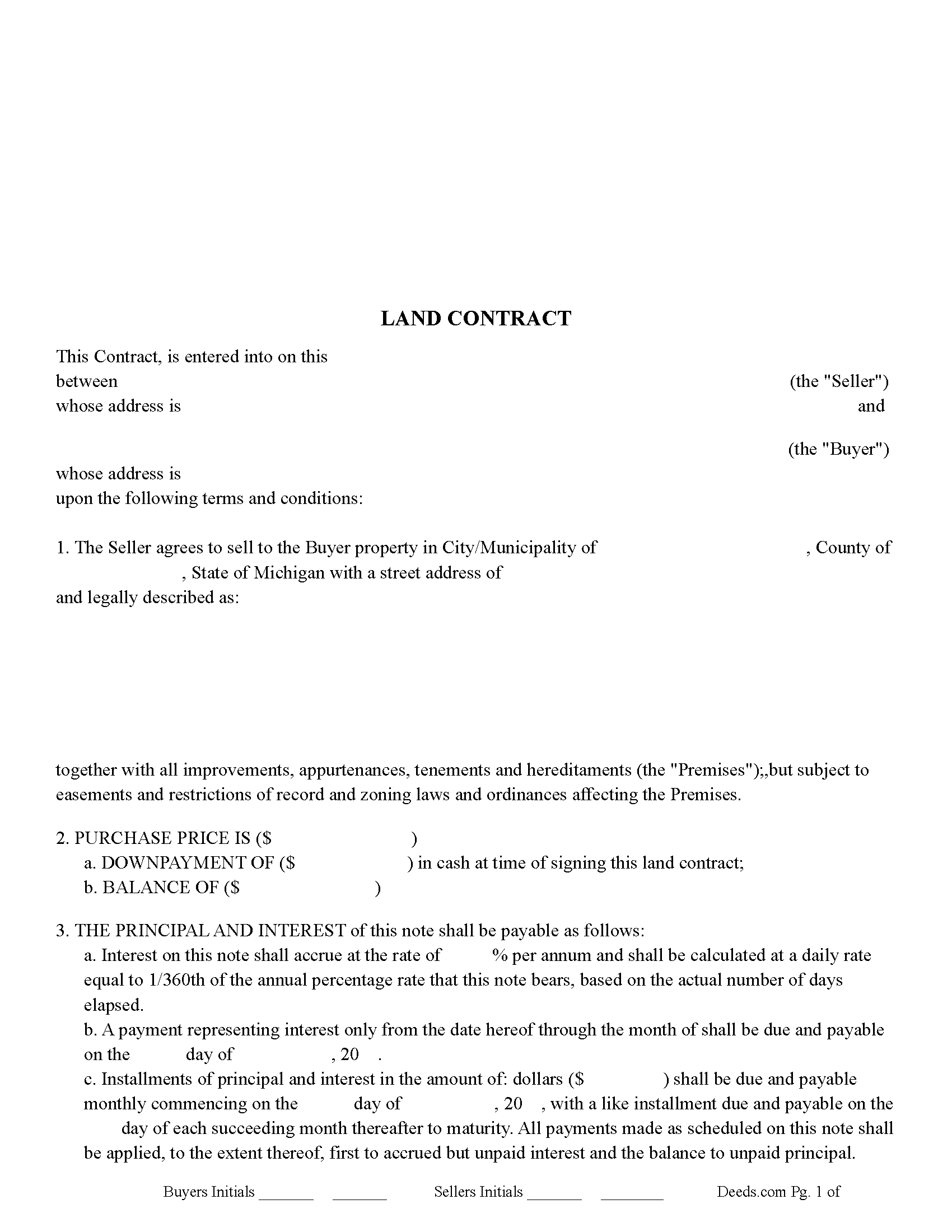
A land contract is a written legal contract used to purchase real estate; it is typically used in owner/seller financing. Once recorded it (shall have the same force and effect, as to subsequent encumbrancers and purchasers, as the recording of deeds and mortgages as now provided by law.) (565.354 section 4)
565.358 Land contract mortgage; document; form; execution, acknowledgement, and
recording; identification of encumbered interest; perfection of mortgage; priority.
Sec. 8.
(1) Any document that would be sufficient to constitute a real estate mortgage upon an interest in
real property shall constitute a land contract mortgage upon the vendor's or vendee's interest.
(2) A land contract mortgage shall be in a form and shall be executed, acknowledged, and recorded in the same manner as provided for real estate mortgages.
(3) A land contract mortgage need not specifically identify the interest encumbered as a vendor's or vendee's interest.
(4) A land contract mortgage that is recorded in the manner provided for real estate mortgages is perfected for all purposes, without filing, under the uniform commercial code, 1962 PA 172, MCL 440.1101 to 440.11102, any notice to the n... More Information about the Michigan Land Contract
Memorandum of Land Contract
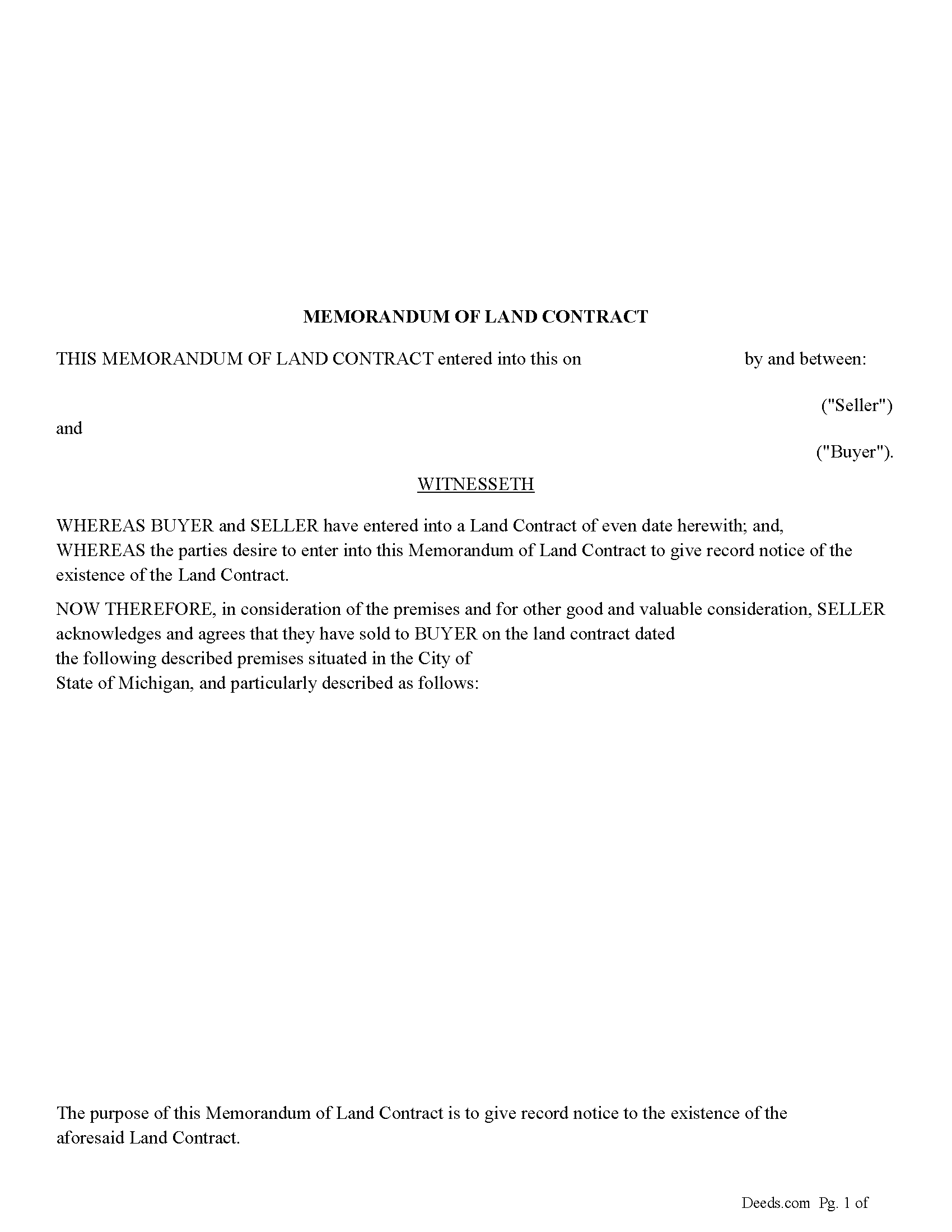
This form serves as notice that the Seller has agreed to sell, and Buyer has agreed to buy a specific property. Record this instrument when a Land Contract has been completed. This is done for a variety of reasons.
A Memorandum of Land Contract serves as a notice to the "world" that a specific property is under a seller-financed purchase agreement.
Often used when parties want the details of a Land Contract to be kept private.
Why a buyer needs a recorded Memorandum of Land Contract. It is important to prevent loans or encumbrances being placed on the property by the existing Deed holder. Encumbrances have been placed on properties even though the Contract states they can't. This can be devastating for a buyer who has made payments. For protection either the Land Contract document or a Memorandum of Land Contract document should be recorded.
Why a Seller needs a recorded Memorandum of Land Contract. When owner financing is involved, and a buyer needs to finance property at a later point in time, a Lending Institution will most likely require a recorded Memorandum document. Further, banks like to see a history of payments, at least 12 months, often referred to as "Seasoni... More Information about the Michigan Memorandum of Land Contract
Durable Power of Attorney
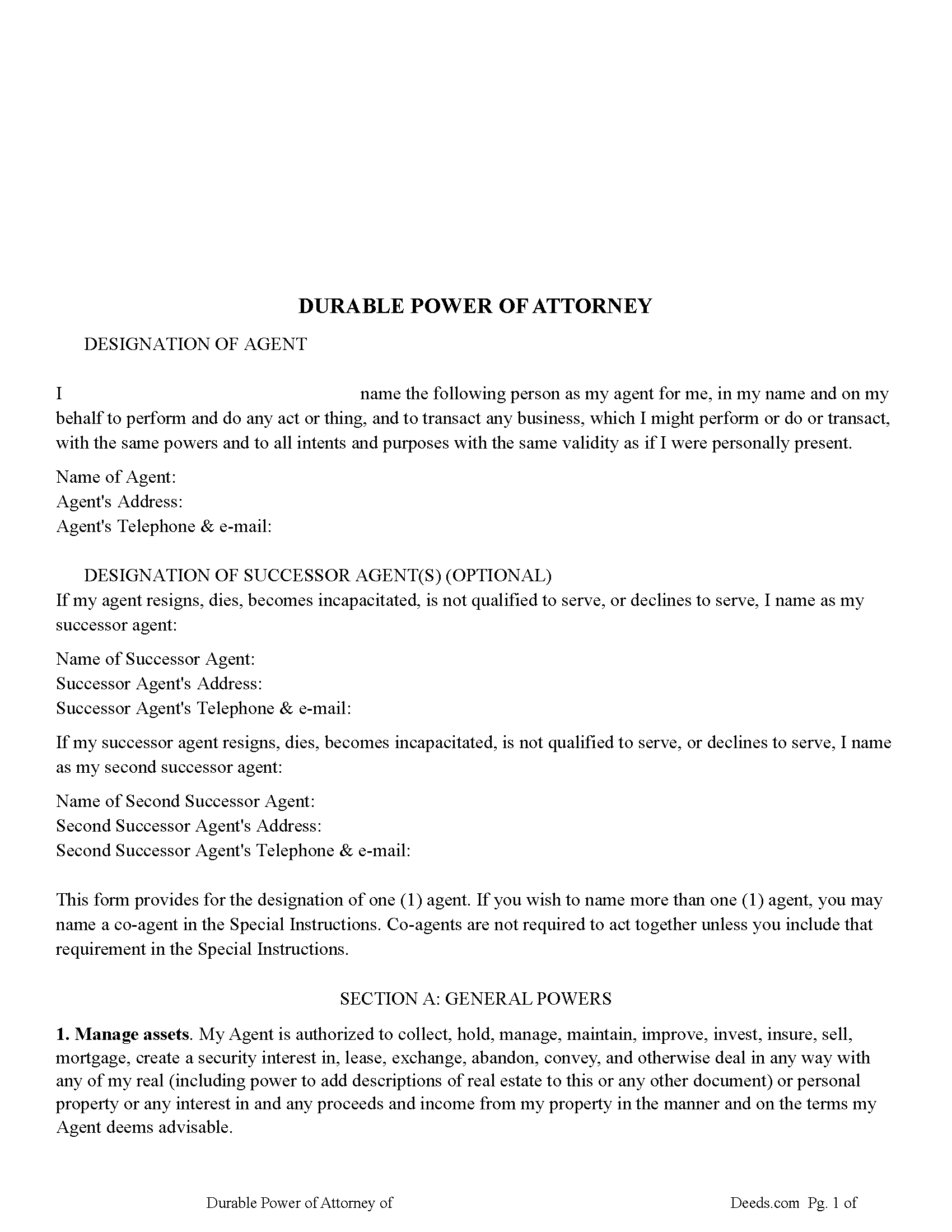
The Principal designates an attorney in fact and contains the words ("This power of attorney is not affected by the principal's subsequent disability or incapacity, or by the lapse of time", or "This power of attorney is effective upon the disability or incapacity of the principal" or similar words showing the principal's intent that the authority conferred is exercisable notwithstanding the principal's subsequent disability or incapacity and, unless the power states a termination time, notwithstanding the lapse of time since the execution of the instrument) (sec.5501.(a))
Sec 5501. (3) An attorney-in-fact designated and acting under a durable power of attorney has the authority, rights, responsibilities, and limitations as provided by law with respect to a durable power of attorney, including, but not limited to, all of the following:
(a) Except as provided in the durable power of attorney, the attorney-in-fact shall act in accordance with the standards of care applicable to fiduciaries exercising powers under a durable power of attorney.
(b) The attorney-in-fact shall take reasonable steps to follow the instructions of the principal.
(c) Upon request of the principal, t... More Information about the Michigan Durable Power of Attorney
Power of Attorney - Seller
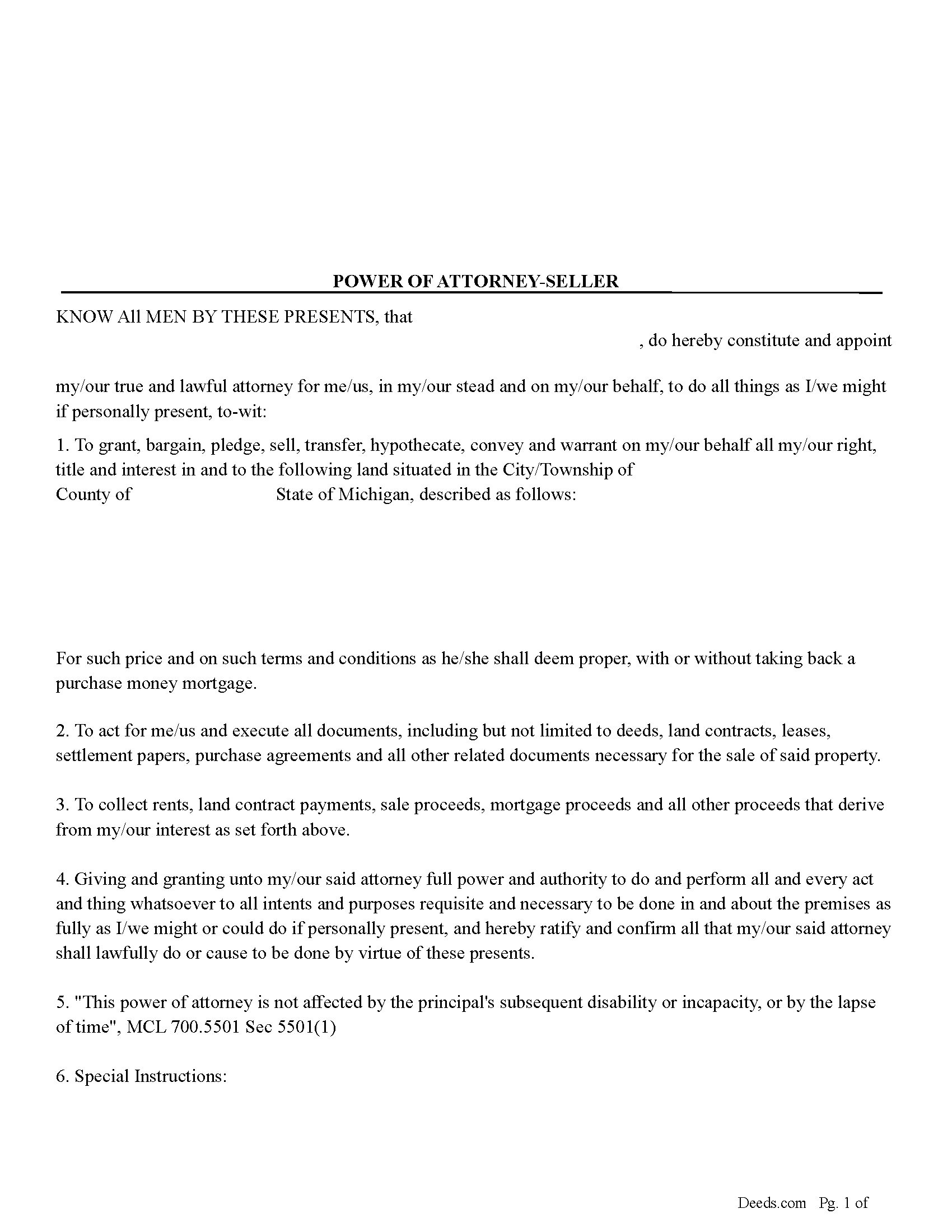
This form allows the principal to appoint an agent to sell a specific property. To act for me/us and execute all documents, including but not limited to deeds, land contracts, leases, settlement papers, purchase agreements and all other related documents necessary for the sale of said property.
Sec. 5501.
(1) A durable power of attorney is a power of attorney by which a principal designates another as the principal's attorney-in-fact in a writing that contains the words "This power of attorney is not affected by the principal's subsequent disability or incapacity, or by the lapse of time", or "This power of attorney is effective upon the disability or incapacity of the principal", or similar words showing the principal's intent that the authority conferred is exercisable notwithstanding the principal's subsequent disability or incapacity and, unless the power states a termination time, notwithstanding the lapse of time since the execution of the instrument.
(Michigan POA-Seller Package includes form, guidelines, and completed example) For use in Michigan only.
... More Information about the Michigan Power of Attorney - Seller
Power of Attorney - Borrower/Buyer
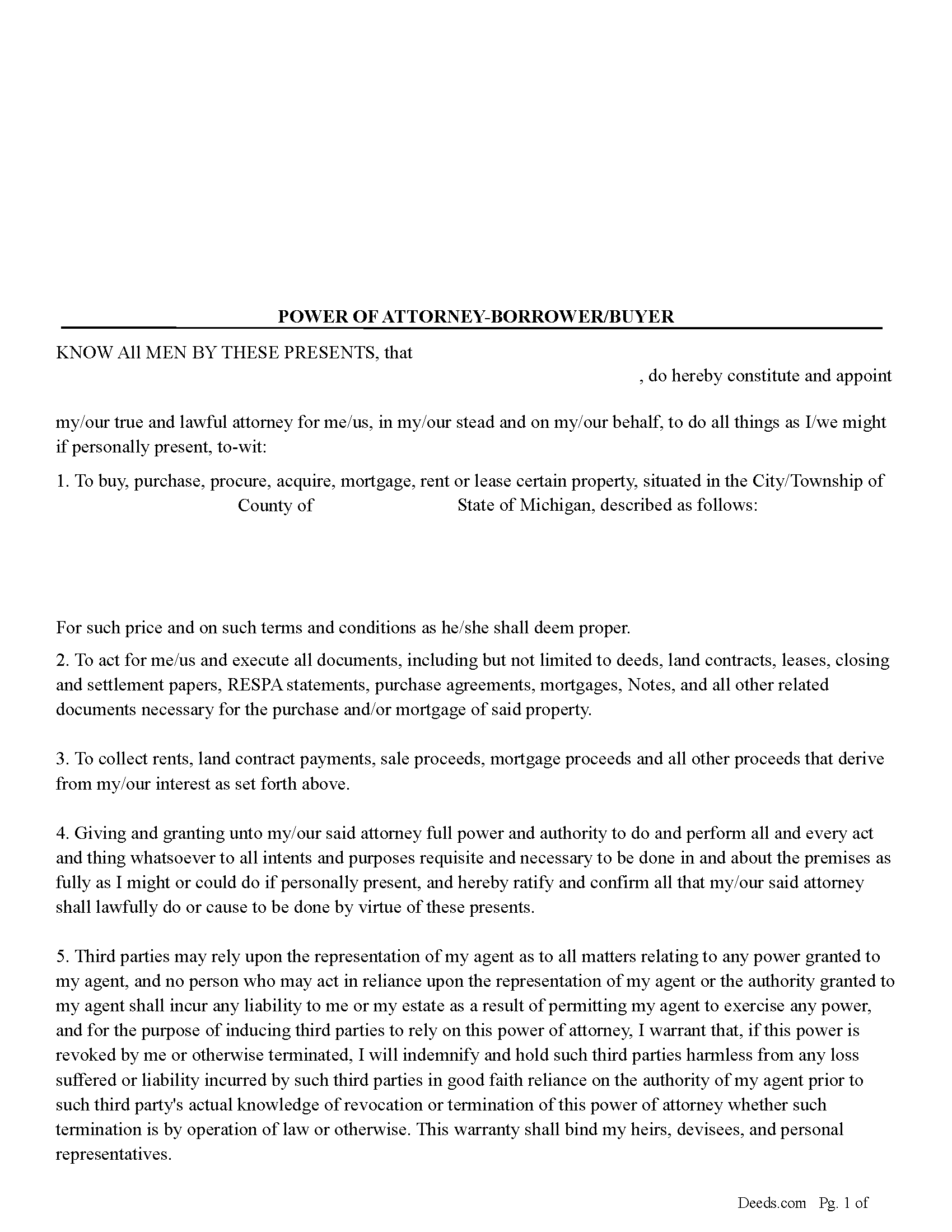
This form allows the principal to appoint an agent to buy, purchase, procure, acquire, mortgage, rent or lease certain property. To act for me/us and execute all documents, including but not limited to deeds, land contracts, leases, closing and settlement papers, RESPA statements, purchase agreements, mortgages, Notes, and all other related documents necessary for the purchase and/or mortgage of said property.
A Special instructions section allows to enter information specific to their situation.
(Michigan POA-Buyer Package includes form, guidelines, and completed example) For use in Michigan only.... More Information about the Michigan Power of Attorney - Borrower/Buyer
Mineral Deed
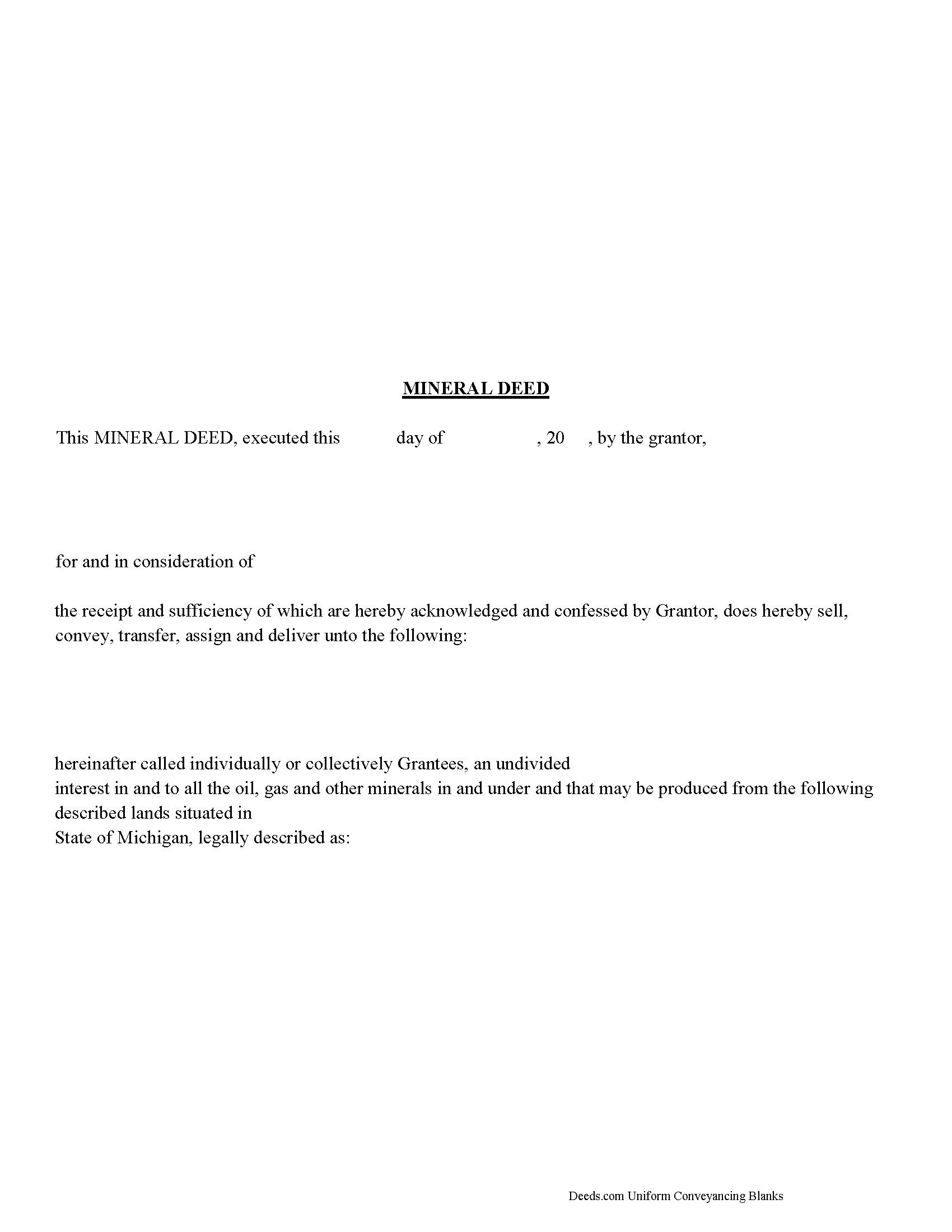
The General Mineral Deed in Michigan transfers oil, gas, and mineral rights from the grantor to the grantee. THIS IS NOT A LEASE. There are no Exceptions or Reservations included.
The transfer includes the oil, gas and other minerals of every kind and nature. It also transfers any and all rights to receive royalties, overriding royalties, net profits interests or other payments out of or with respect to those oil, gas and other minerals. The Grantor can stipulate the percentage of Mineral Rights the Grantee will receive and is made subject to any rights existing under any valid and subsisting oil and gas lease or leases of record.
This general mineral deed gives the grantee the right to access, for the purpose of mining, drilling, exploring, operating and developing said lands for oil, gas, and other minerals, and storing handling, transporting and marketing of such.
In this document the Grantor Warrants and will defend said Title to Grantee. Use of this document has a permanent effect on your rights to the property, if you are not completely sure of what you are executing seek the advice of a legal professional.
(Michigan MD Package includes form, guidelines, and compl... More Information about the Michigan Mineral Deed
Mineral Deed with Quitclaim Covenants
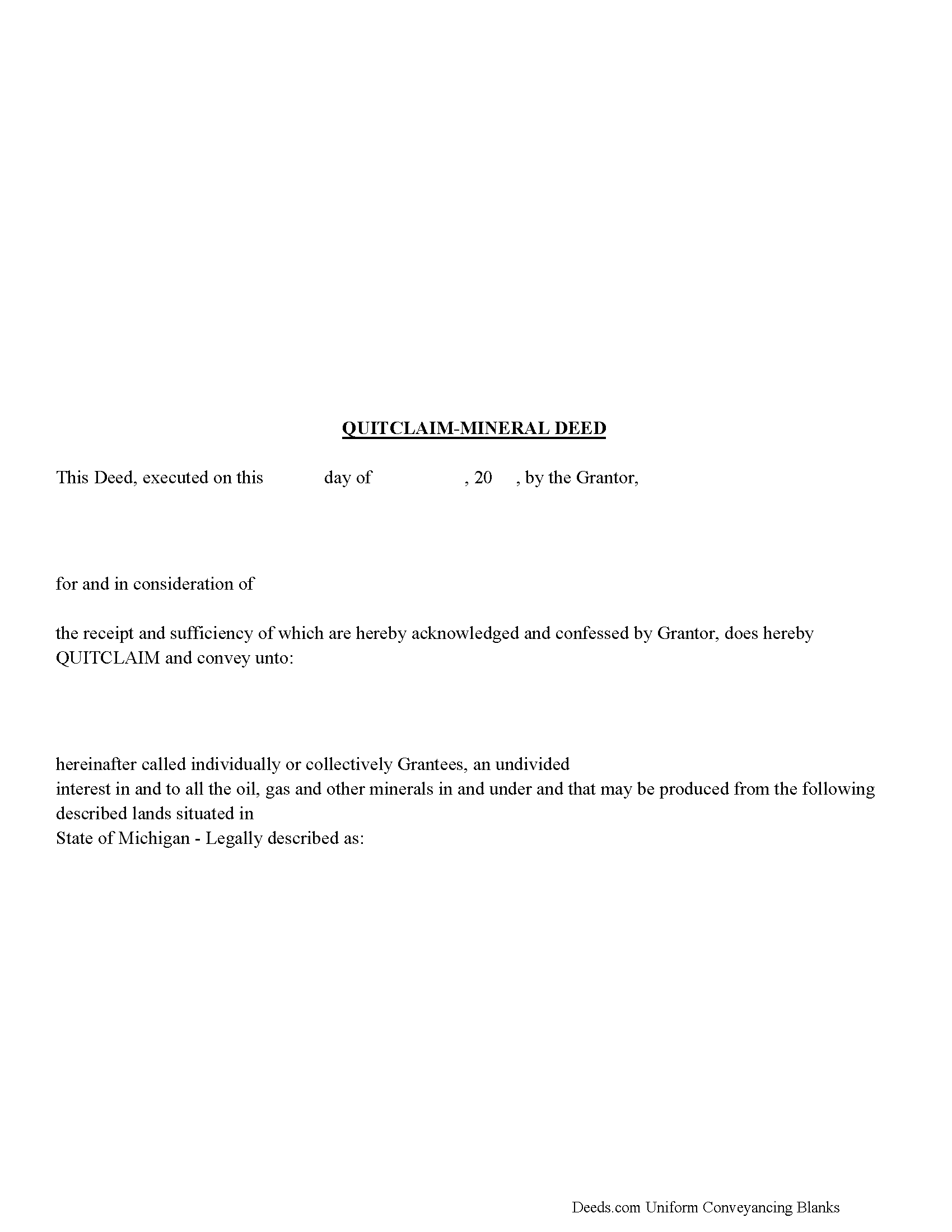
The General Mineral Deed in Michigan Quitclaims oil, gas, and mineral rights from the grantor to the grantee. THIS IS NOT A LEASE. There are no Exceptions or Reservations included.
The transfer includes the oil, gas and other minerals of every kind and nature. The Grantor can stipulate the percentage of Mineral Rights the Grantee will receive.
This general mineral deed gives the grantee the right to access, for the purpose of mining, drilling, exploring, operating and developing said lands for oil, gas, and other minerals, and storing handling, transporting and marketing of such.
The seller, or grantor Quitclaims the mineral rights and does NOT accept responsibility to any discrepancy of title (This assignment is without warranty of title, either express or implied)
Uses: Mineral deeds with quitclaim are often used in situations where the grantor wants to quickly release any interest they might have in mineral rights, such as in settling estates, resolving disputes, clearing up uncertainties about ownership in a title's history or when mineral rights have previously been severed or fragmented from surface rights and cloud a title, making it difficult to transfer propert... More Information about the Michigan Mineral Deed with Quitclaim Covenants
Personal Representative Deed
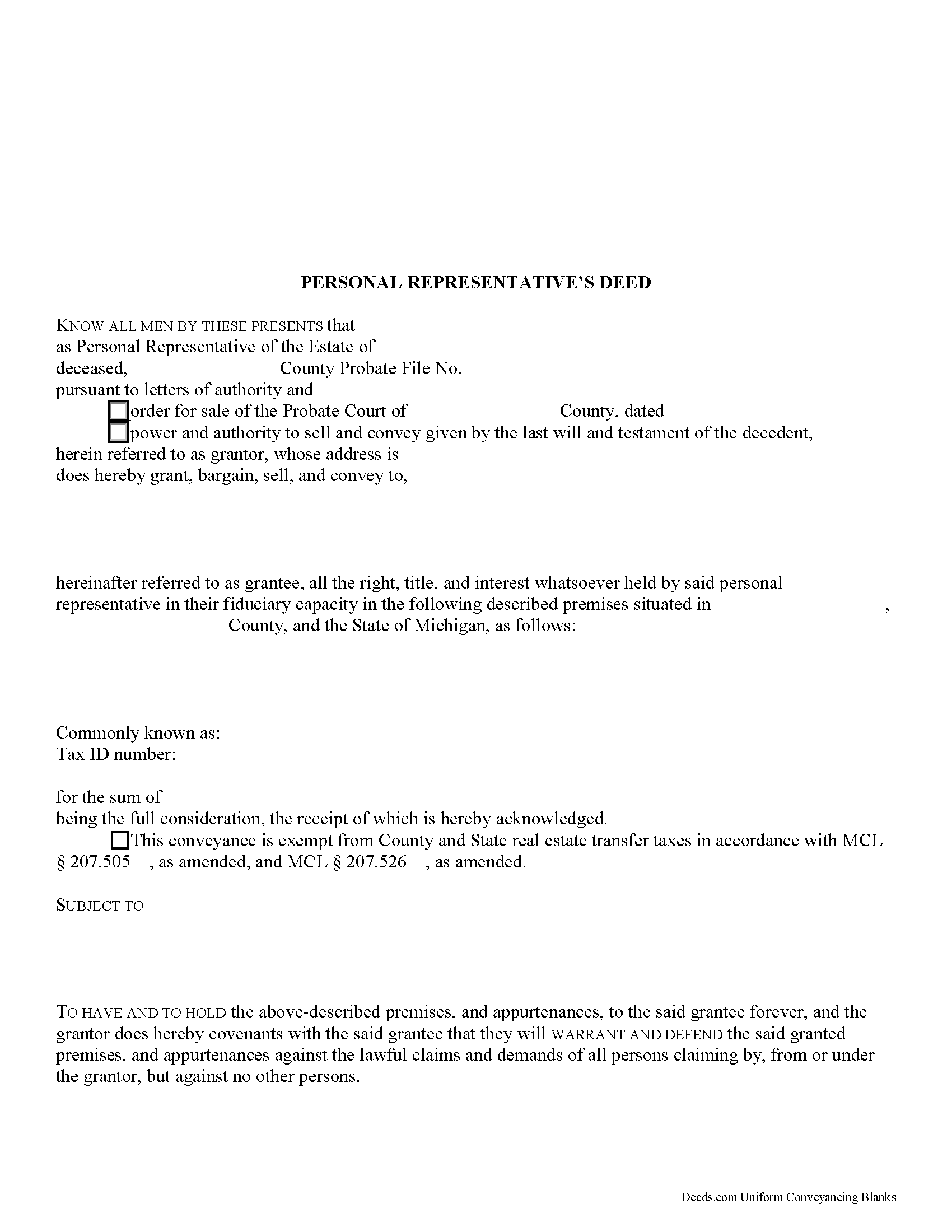
In the State of Michigan, the administration and distribution of estates is governed by MCL Chapter 700, known as the estates and protected individuals code.
When a Michigander dies, probate -- the process of settling a decedent's estate, including gathering the decedent's assets, paying debts and taxes, and distributing what is left of the estate to those entitled to receive it -- takes place in the county in which the decedent was domiciled at the time of death. Michigan Probate Courts oversee probate proceedings. The extent to which the court supervises administration is dependent upon the type of probate opened. Administration of the estate is generally unsupervised, unless the specific situation necessitates otherwise.
All property owned by the decedent individually is subject to probate. Property held with a survivorship interest, beneficiary designation, or in a trust skips probate.
Administration officially begins when the court appoints a personal representative (PR) who will personally settle the decedent's estate. Michigan uses the general term personal representative, though he or she may be either the executor of the decedent's will, or an administrator of an... More Information about the Michigan Personal Representative Deed
Notice of Commencement
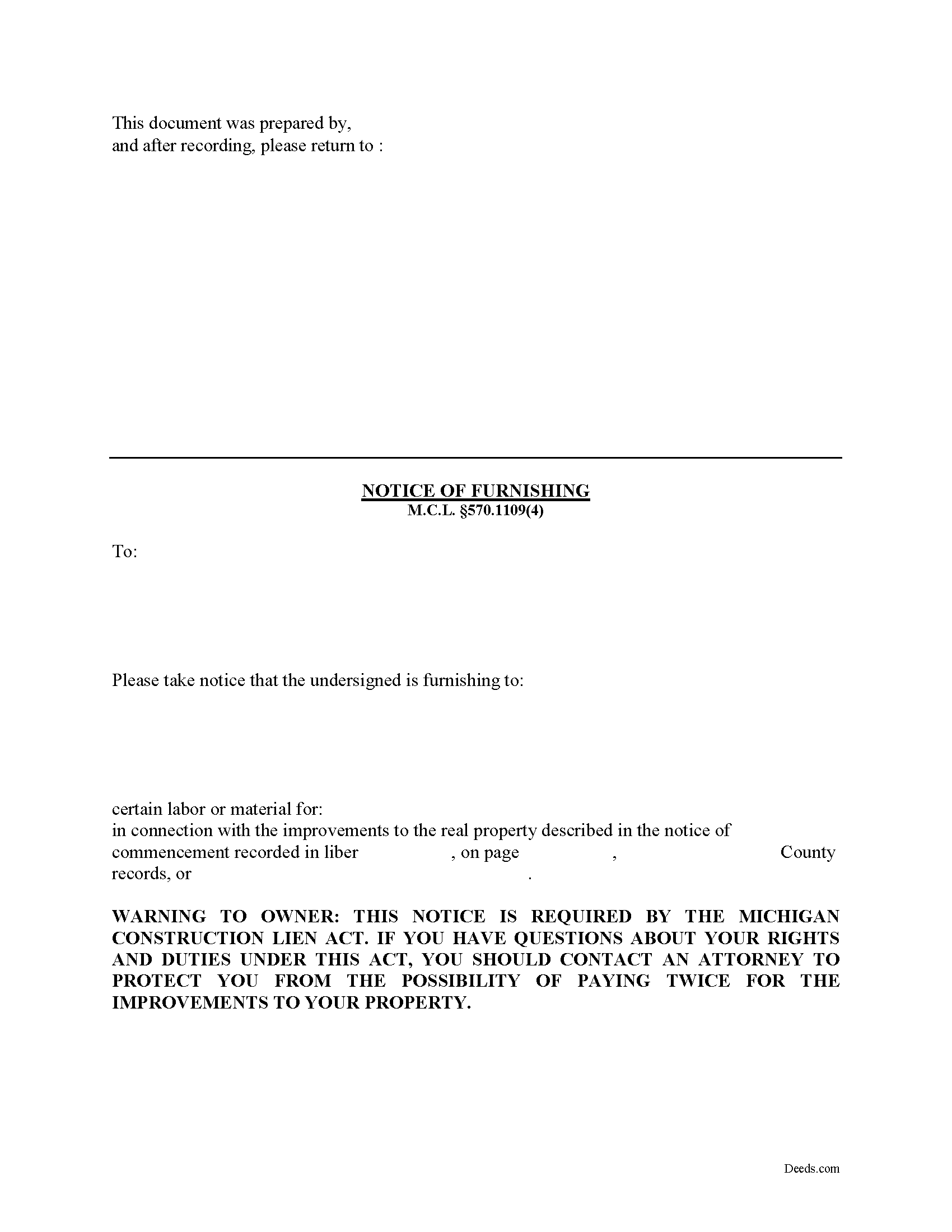
Using a Notice of Commencement in Michigan
A Notice of Commencement is a form executed by a land owner or lessee before the start of any actual physical improvement to real property. The owner or lessee contracting for the improvements must record a Notice of Commencement in the office of the register of deeds for each county in which the real property to be improved is located. M.C.L. 570.1108(1). Recording a Notice of Commencement also starts the clock ticking for the contractor, subcontractor, or supplier to file his or her Notice of Furnishing.
The notice of commencement must contain the following information: (1) the legal description of the real property on which the improvement is to be made; (2) the name, address, and capacity of the owner or lessee of the real property contracting for the improvement; (3) the name and address of the fee owner of the real property, if the person contracting for the improvement is a land contract vendee or lessee; (4) the name and address of the owner's or lessee's designee; and (5) the name and address of the general contractor, if any. M.C.L. 570.1108(2).
Even if parts of the Notice are inaccurate, any incorrect information contai... More Information about the Michigan Notice of Commencement
Notice of Furnishing
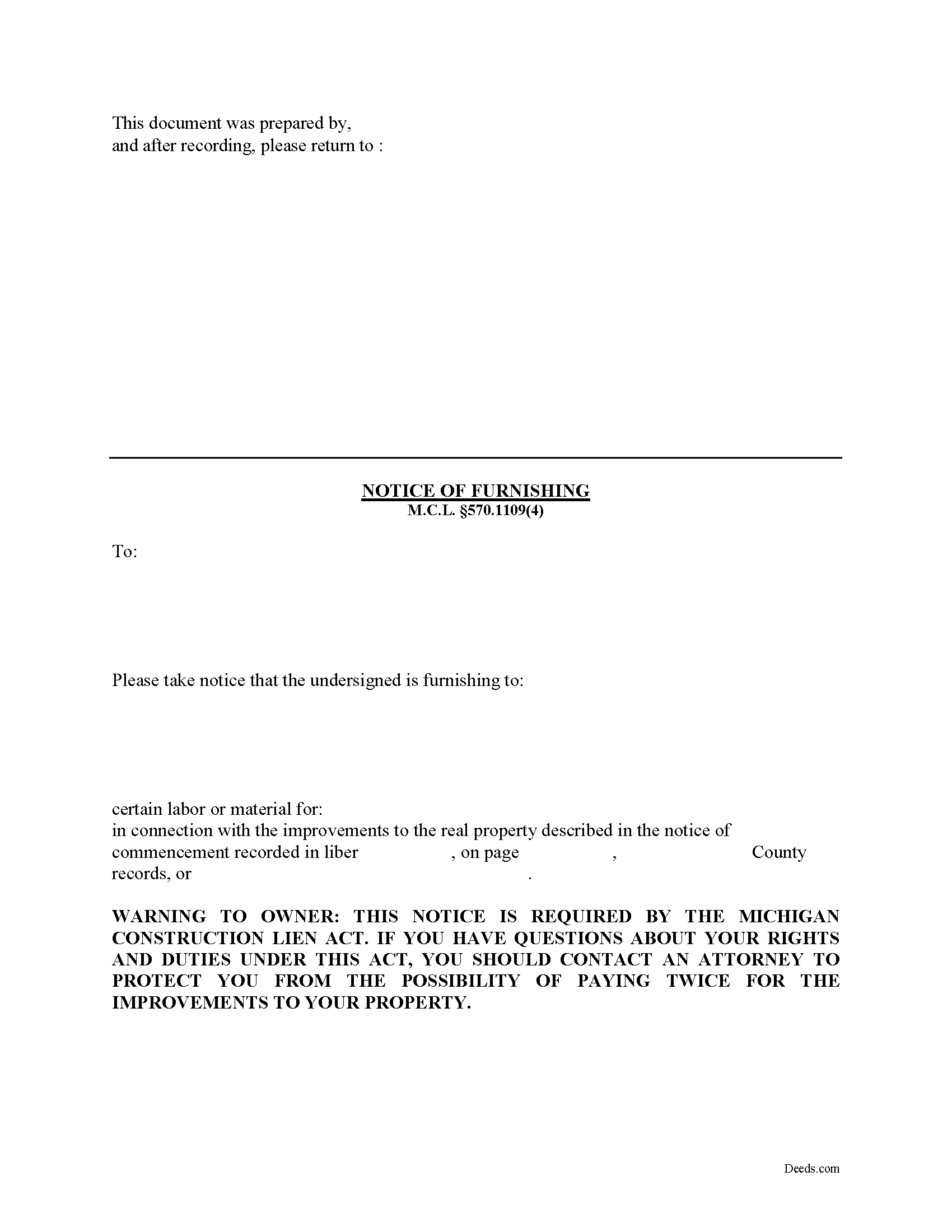
Using a Notice of Furnishing in Michigan
Proper notice is key to a successful lien claim. A Notice of Furnishing is a type of preliminary notice that must be provided to a property owner by a subcontractor, contractor, laborer, or supplier as a condition to obtaining a later mechanic's lien covering the full amount of labor or supplies. This Notice must be sent by any party who has not contracted directly with the owner to preserve that party's lien right.
In Michigan, a subcontractor or supplier who contracts to provide an improvement to real property must provide a Notice of Furnishing to the designee and the general contractor, if there is one (as named in the Notice of Commencement) at the address shown in the Notice of Commencement, either personally or by certified mail, within 20 days after furnishing the first labor or material. M.C.L. 570.1109(1).
The Notice of Furnishing must contain the following information by law: (1) the name of the owner (or designee or lessee) as noted in the Notice of Commencement; (2) the name and address of the claimant furnishing materials or services; (3) description of services or materials furnished; (4) the book number and page numb... More Information about the Michigan Notice of Furnishing
Sworn Statement of Account
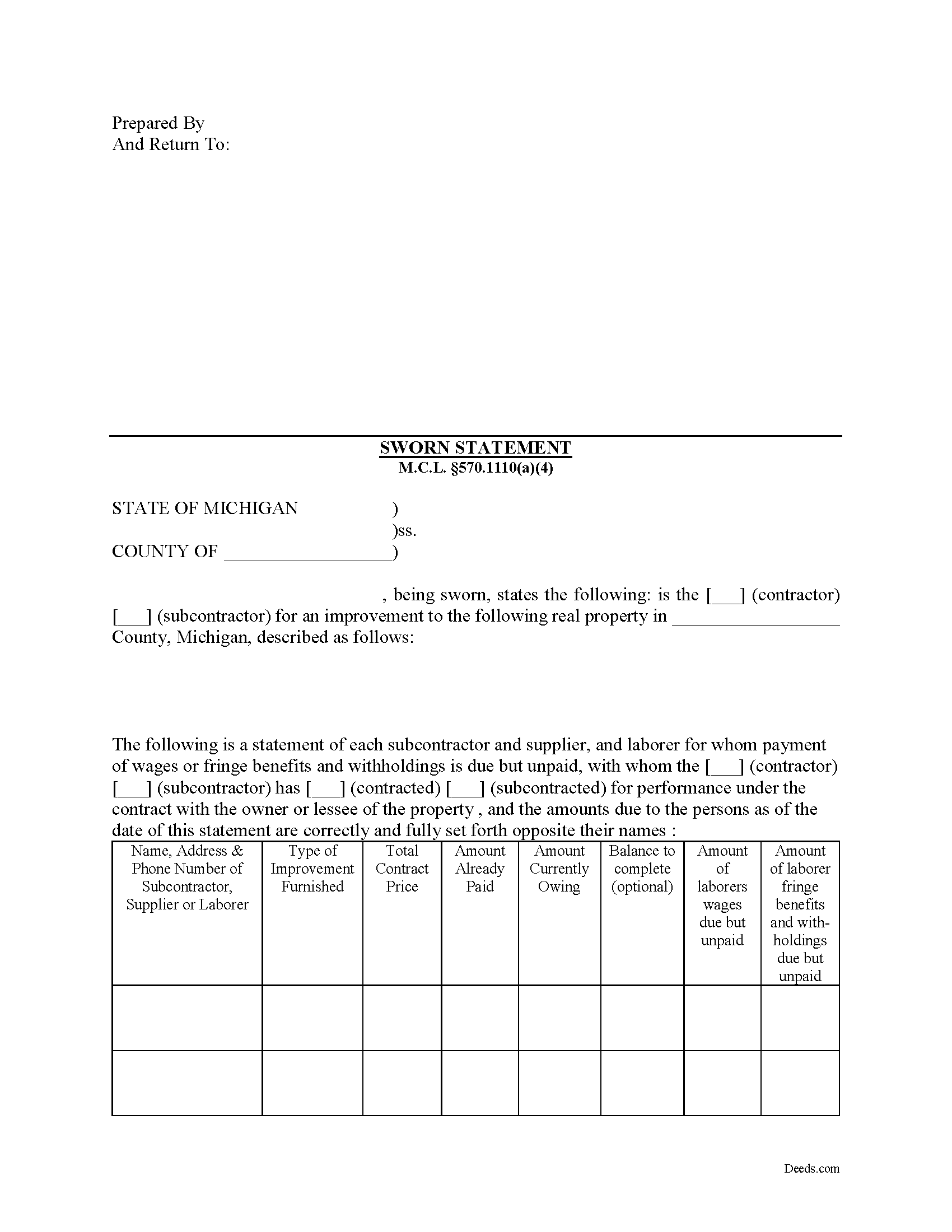
Using a Sworn Statement of Account in Michigan
A Sworn Statement of Account is an itemized list containing the names and identifying information for all the parties that have provided improvements, materials or labor and an accounting of the money that is owed to them.
Under Michigan law, a contractor must provide a sworn statement to the owner or lessee in each of the following circumstances: (a) when payment is due to the contractor from the owner or lessee or when the contractor requests payment from the owner or lessee, or (b) when a demand for the sworn statement has been made by or on behalf of the owner or lessee. M.C.L. 570.1110(1). A subcontractor must provide a sworn statement to the owner or lessee upon request by or on behalf of the owner or lessee. M.C.L. 570.1110(2). Subcontractors must also provide a sworn statement to the contractor when payment is due to the subcontractor from the contractor or when the subcontractor requests payment from the contractor. M.C.L. 570.1110(3).
The sworn statement must list each subcontractor and supplier with whom the person issuing the sworn statement has contracted relative to the improvement to the real property. M.C.L. 57... More Information about the Michigan Sworn Statement of Account
Claim of Lien
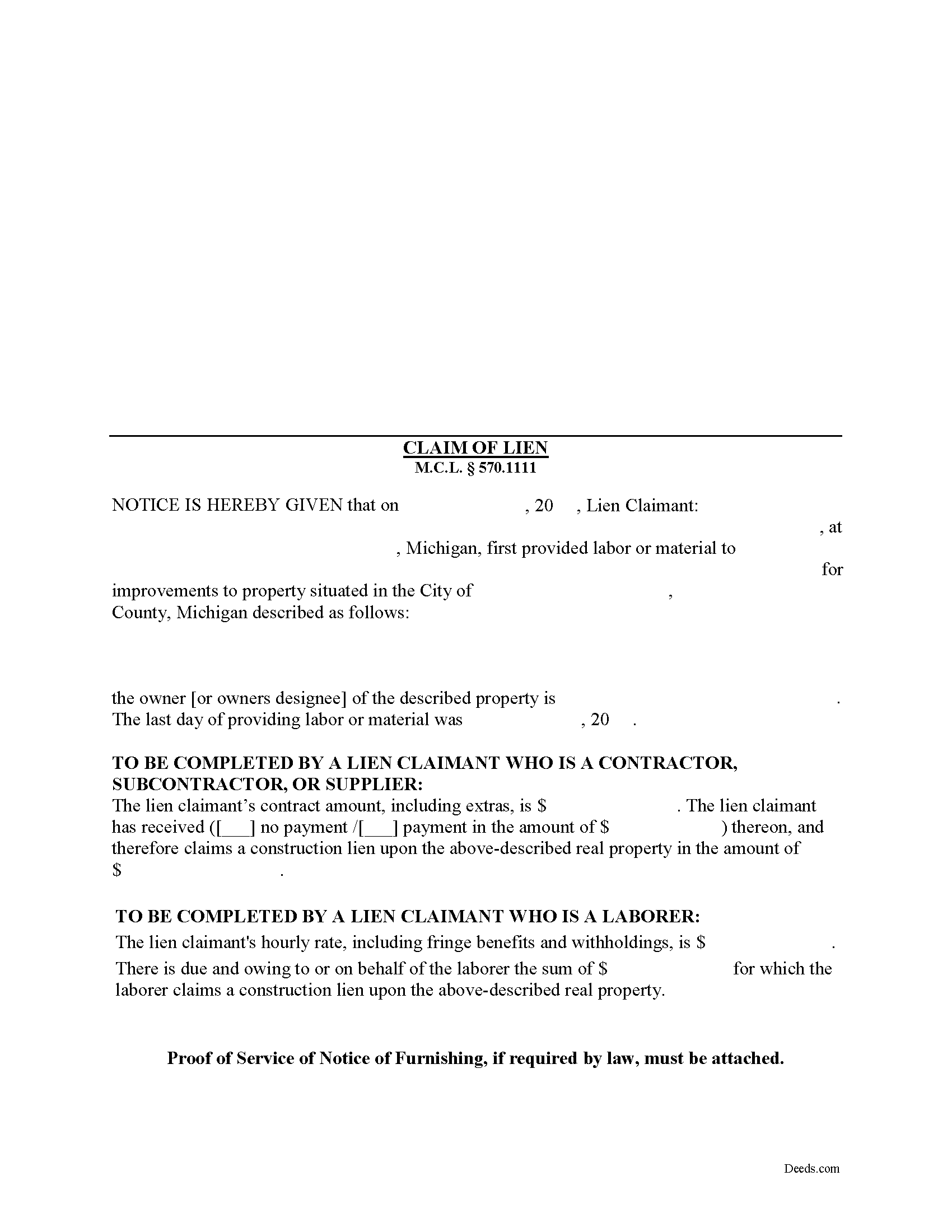
Claiming a Mechanic's Lien in Michigan
A mechanic's lien (sometimes called a construction or contractor's lien) is a remedy available to contractors, subcontractors, laborers, and material suppliers to help recover money due, but unpaid, for services or materials on a construction job. In many ways, a lien is a property interest like a mortgage. In Michigan, the Construction Lien Act (Act 497 of 1980) governs the procedure for obtaining this kind of lien.
In order to preserve the right of a contractor, subcontractor, laborer, or supplier to a construction lien, the contractor (or other claimant) must record a claim of lien within 90 days after the last furnishing of labor or material for the improvement, in the office of the register of deeds for each county where the real property to which the improvement was made is located. M.C.L. 570.1111(1).
A claim of lien is valid only as to the real property described in the claim of lien and located within the county where the claim of lien has been recorded. Id. It must contain the following information: (1) the date of first furnishing; (2) lien claimant's name; (3) name of person contracted with; (4) description of the subject ... More Information about the Michigan Claim of Lien
Partial Conditional Waiver of Lien
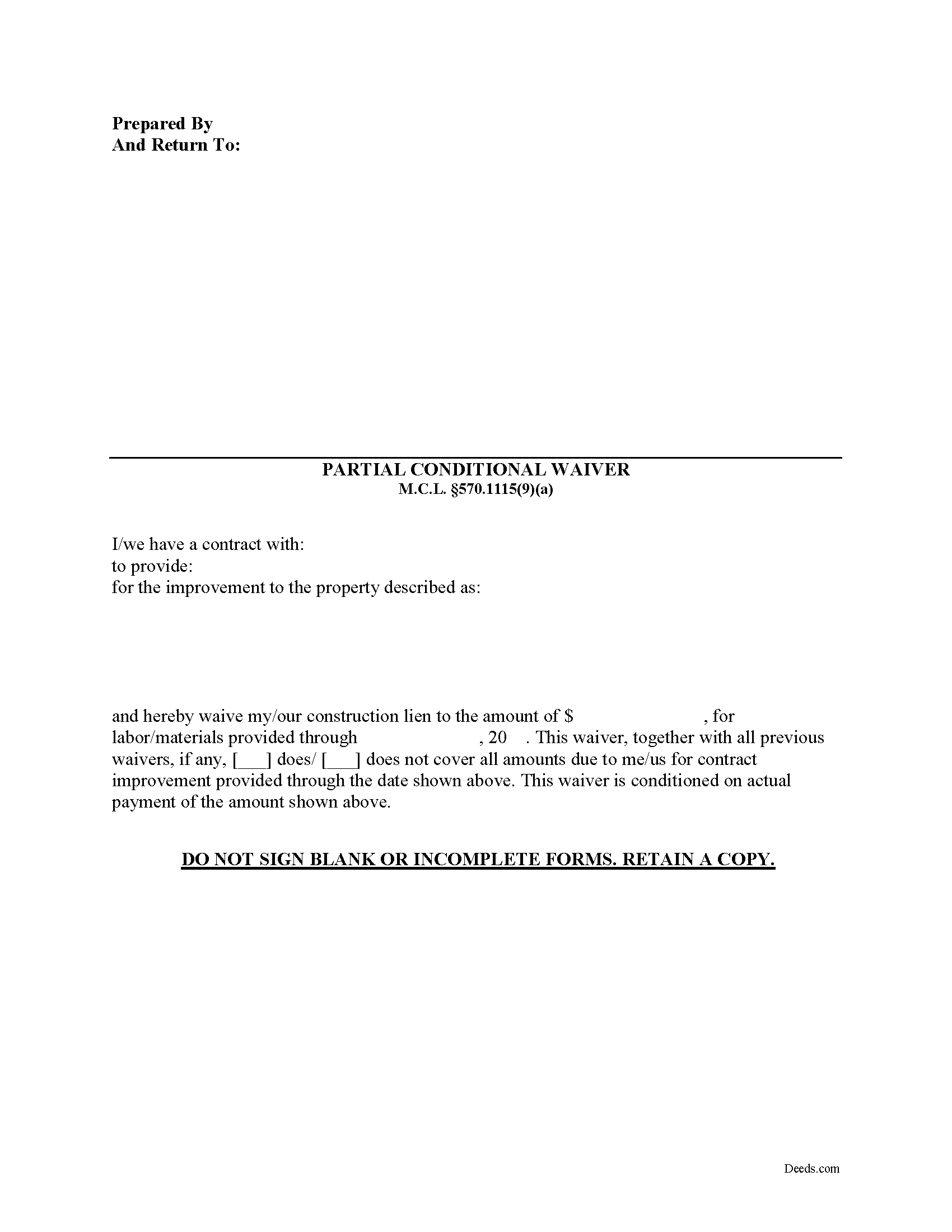
During the construction process, a property owner (or his or her lessee) may ask the contractor for a lien waiver in exchange for a full or partial payment.
Michigan defines four permissible types of lien waivers. These include: (1) Partial Unconditional Waiver, (2) Partial Conditional Waiver, (3), Full Unconditional Waiver, and (4) Full Conditional Waiver. M.C.L. 570.1115(9).
Use a partial conditional waiver of lien when the claimant receives an agreed-upon payment for his or her contract from the owner, lessee, or designee. M.C.L. 570.1115(4). This partial payment may be a scheduled disbursement, be tied to a progress point in the improvement process, or another circumstance as set out in the original contract.
A waiver under this section takes effect when a person makes payment relying on the waiver, unless at the time the payment was made, the person making the payment had written notice that the payment or consideration for the waiver has failed (i.e., the check bounced at the bank). M.C.L. 570.1115(6).
Lien waiver forms must be in writing and must comply with Michigan law to be valid. Include the names of the contractor and the property owner, and identify the ... More Information about the Michigan Partial Conditional Waiver of Lien
Partial Unconditional Waiver of Lien
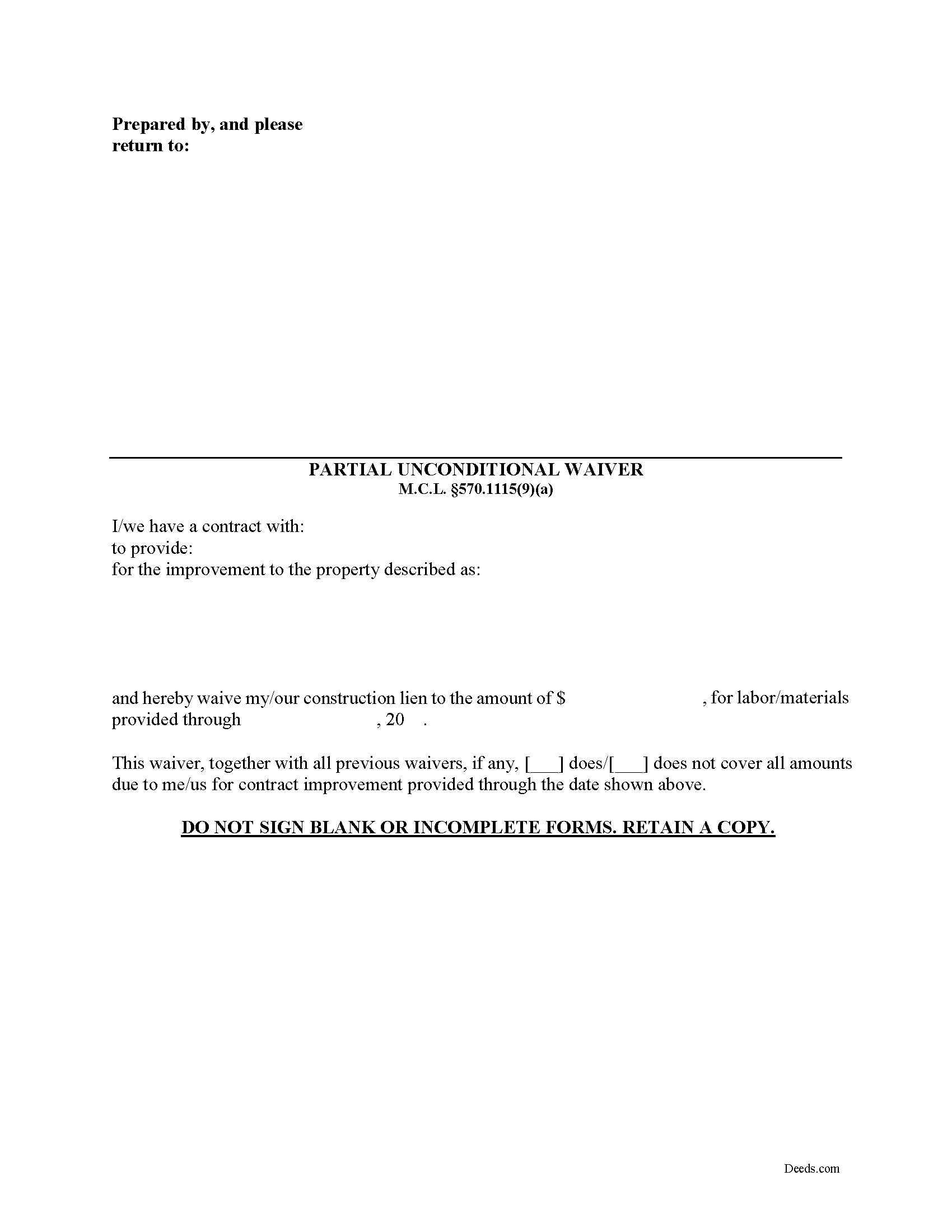
During the construction process, a property owner (or his or her lessee) may ask the contractor for a lien waiver in exchange for a full or partial payment.
Michigan defines four permissible types of lien waivers. These include: (1) Partial Unconditional Waiver, (2) Partial Conditional Waiver, (3), Full Unconditional Waiver, and (4) Full Conditional Waiver. M.C.L. 570.1115(9).
Use a partial unconditional waiver of lien when the claimant receives an agreed-upon payment for his or her contract from the owner, lessee, or designee. M.C.L. 570.1115(3). This partial payment may be a scheduled disbursement, be tied to a progress point in the improvement process, or another circumstance as set out in the original contract.
A waiver under this section takes effect when a person makes payment relying on the waiver, unless at the time the payment was made, the person making the payment had written notice that the payment or consideration for the waiver has failed (i.e., the check bounced at the bank). M.C.L. 570.1115(6).
Lien waiver forms must be in writing and must comply with Michigan law to be valid. Include the names of the contractor and the property owner, and identify th... More Information about the Michigan Partial Unconditional Waiver of Lien
Full Conditional Waiver of Lien
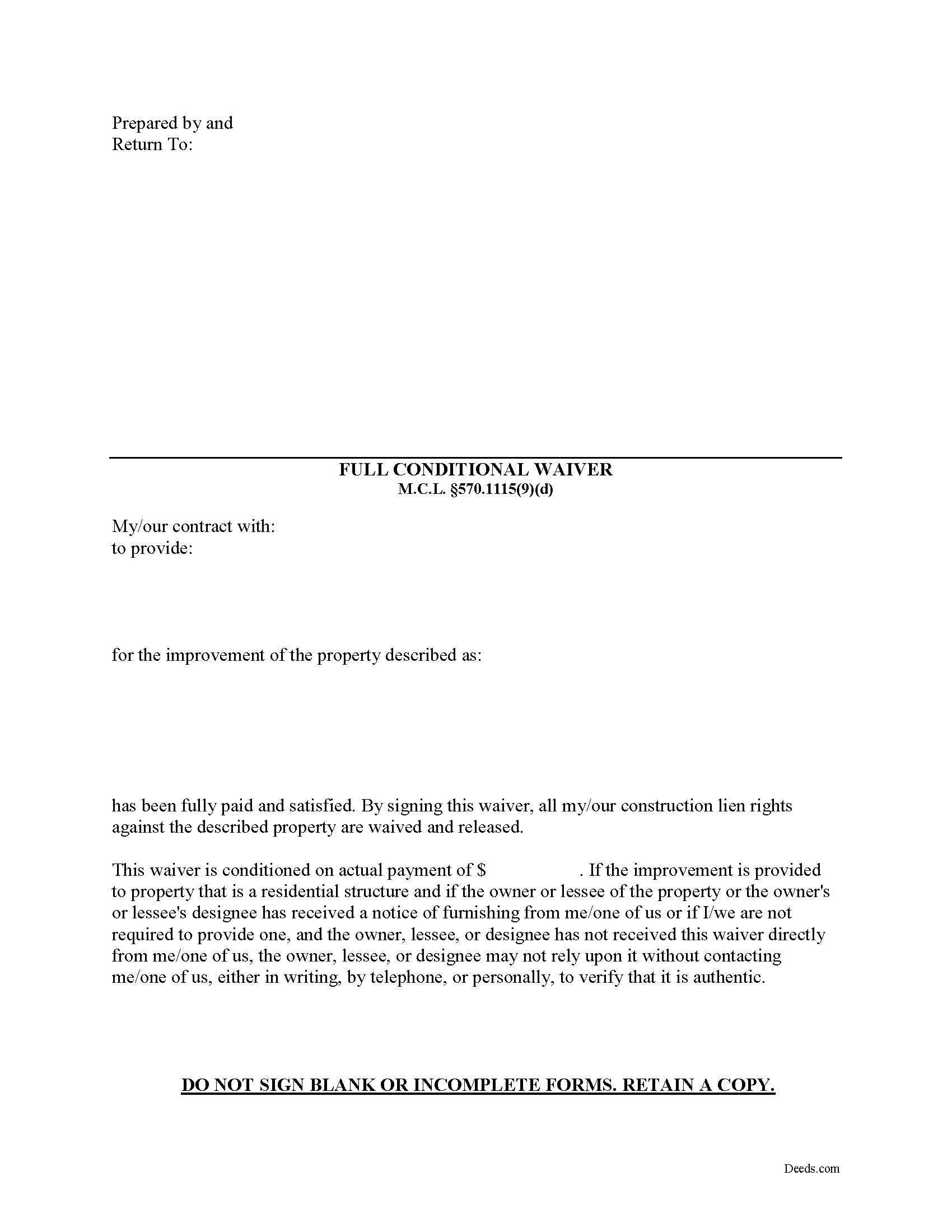
During the construction process, a property owner (or his or her lessee) may ask the contractor for a mechanic's lien waiver in exchange for a full or partial payment.
Michigan defines four permissible types of lien waivers. These include: (1) Partial Unconditional Waiver, (2) Partial Conditional Waiver, (3), Full Unconditional Waiver, and (4) Full Conditional Waiver. M.C.L. 570.1115(9).
Use a full conditional waiver of lien when the claimant receives full payment for his or her contract from the owner, lessee, or designee. M.C.L. 570.1115(4). A waiver of a lien under this section takes effect when a person makes payment relying on the waiver, unless at the time the payment was made, the person making the payment had written notice that the payment or consideration for the waiver has failed (i.e., the check bounced at the bank). M.C.L. 570.1115(6).
Lien waiver forms must be in writing and must comply with Michigan law to be valid. Include the names of the contractor and the property owner, and identify the property and dates covered by the recorded lien.
Lien waivers can be confusing and issuing the wrong type of waiver (or issuing one too early) can result in dire c... More Information about the Michigan Full Conditional Waiver of Lien
Full Unconditional Waiver of Lien
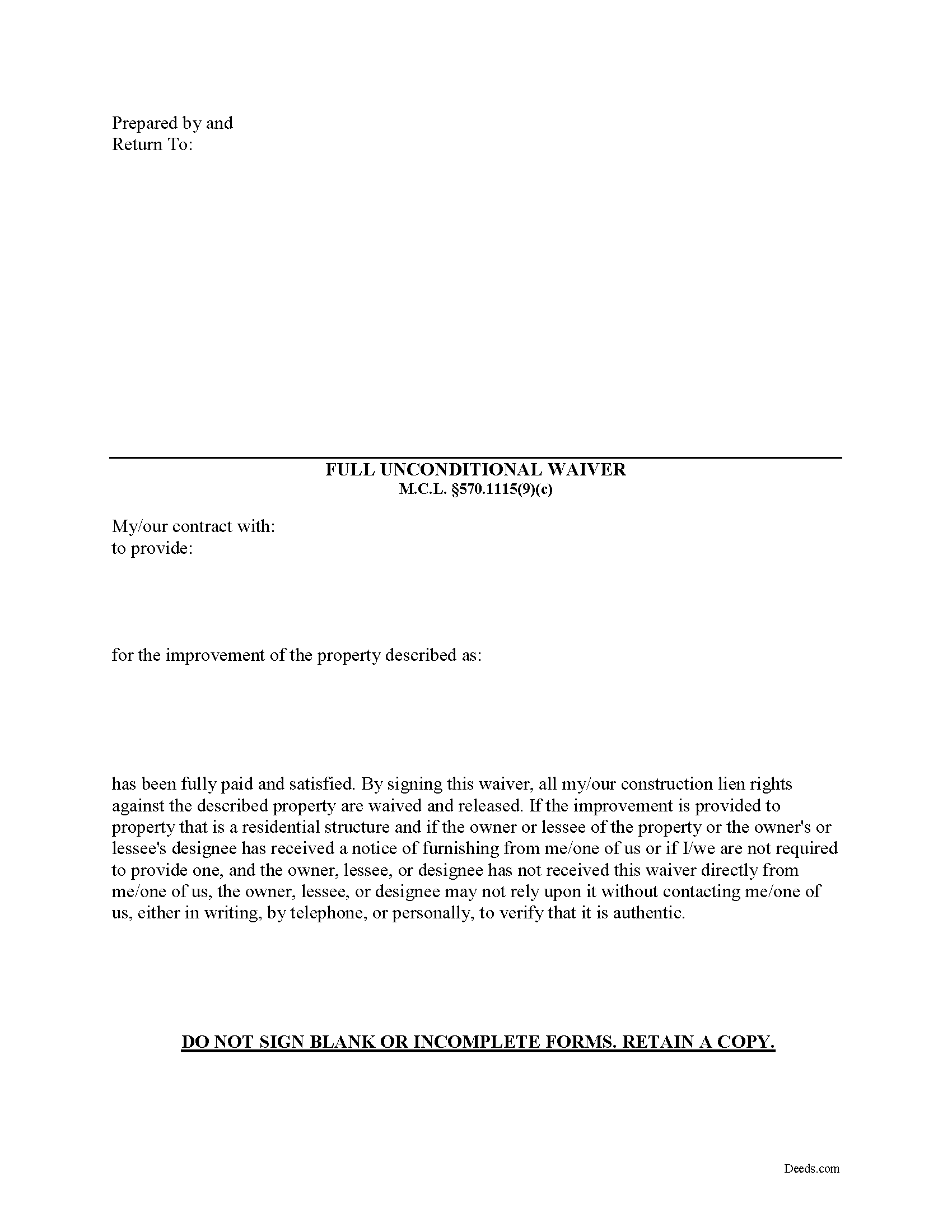
During the construction process, a property owner (or his or her lessee) may ask the contractor for a mechanic's lien waiver in exchange for a full or partial payment.
Michigan law defines four permissible types of lien waivers. These include: (1) Partial Unconditional Waiver, (2) Partial Conditional Waiver, (3), Full Unconditional Waiver, and (4) Full Conditional Waiver. M.C.L. 570.1115(9).
Use a full unconditional waiver of lien when the claimant receives full payment for his or her contract from the owner, lessee, or designee. M.C.L. 570.1115(2).
A waiver of a lien will be effective when a person makes a payment relying on the waiver, unless at the time the payment was made, the person making the payment had written notice that the payment or consideration for the waiver has failed (i.e., the check bounced at the bank). M.C.L. 570.1115(6).
Lien waiver forms must be in writing and must comply with Michigan law to be valid. Include the names of the contractor and the property owner, and identify the property covered by the recorded lien.
Lien waivers can be confusing and issuing the wrong kind of waiver (or issuing one too early) can result in dire consequences f... More Information about the Michigan Full Unconditional Waiver of Lien
Discharge of Lien
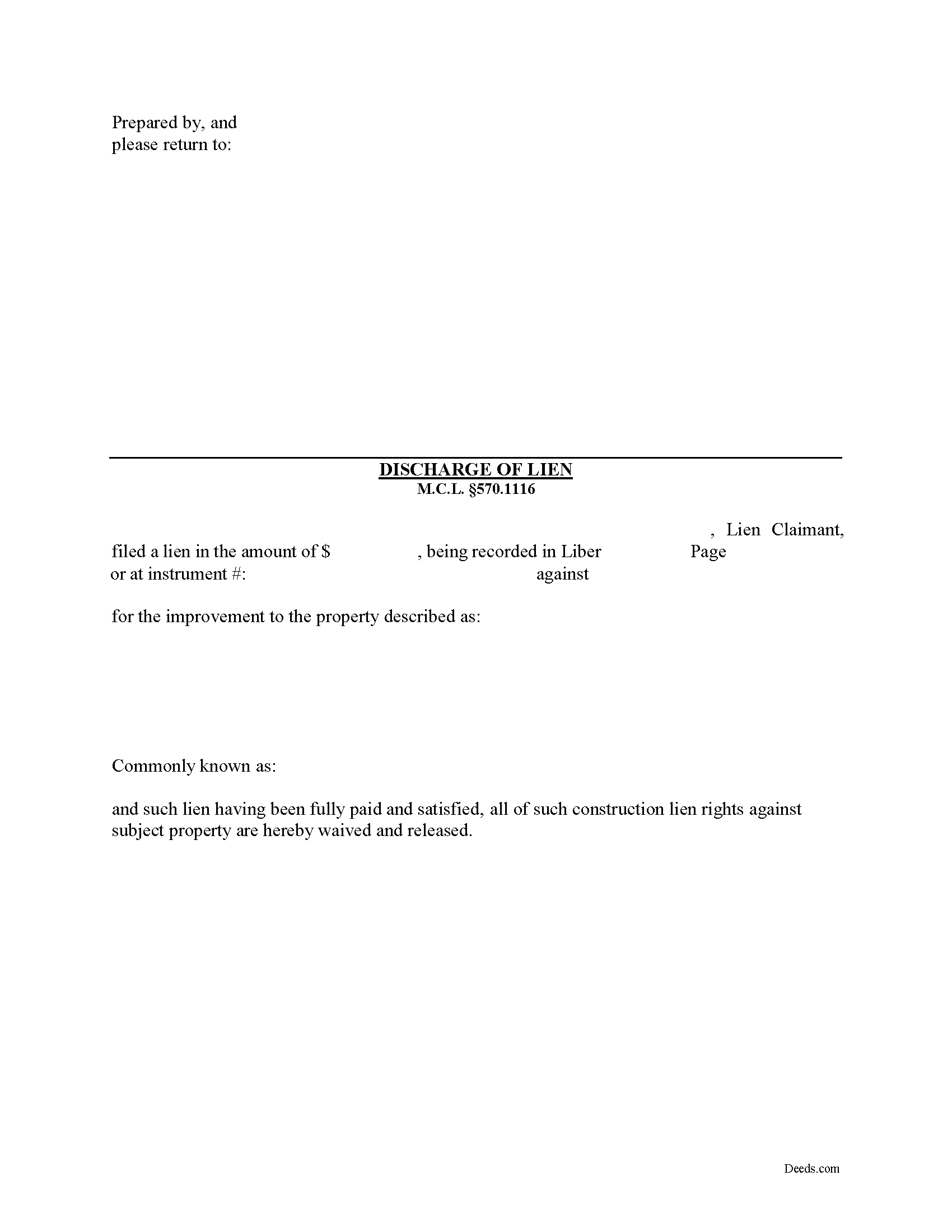
Discharging a Claim of Mechanics or Construction Lien in Michigan
Lien claims must be discharged when the underlying claim is paid or the lien must be dissolved for any other reason provided by law. To accomplish this, the claimant records a discharge of lien document in the Register of Deeds in the county where the property is located. The lien is officially released after recording this form.
The discharge of lien form contains the following information: (1) lien claimant's name, (2) amount of the lien claim, (3) the book and page number where the recorded lien claim can be found in the county register of deeds, (4) property owner's name, (5) legal property description, and (6) common name of the property. Take care when discharging the lien, because once the lien has been officially released, the claimant loses a valuable tool to coerce payment.
This article is provided for informational purposes only and should not be relied on as a substitute for the advice of an attorney. Please consult a Michigan attorney with any questions about discharging a recorded lien claim, or any other issues related to liens.... More Information about the Michigan Discharge of Lien
Disclaimer of Interest
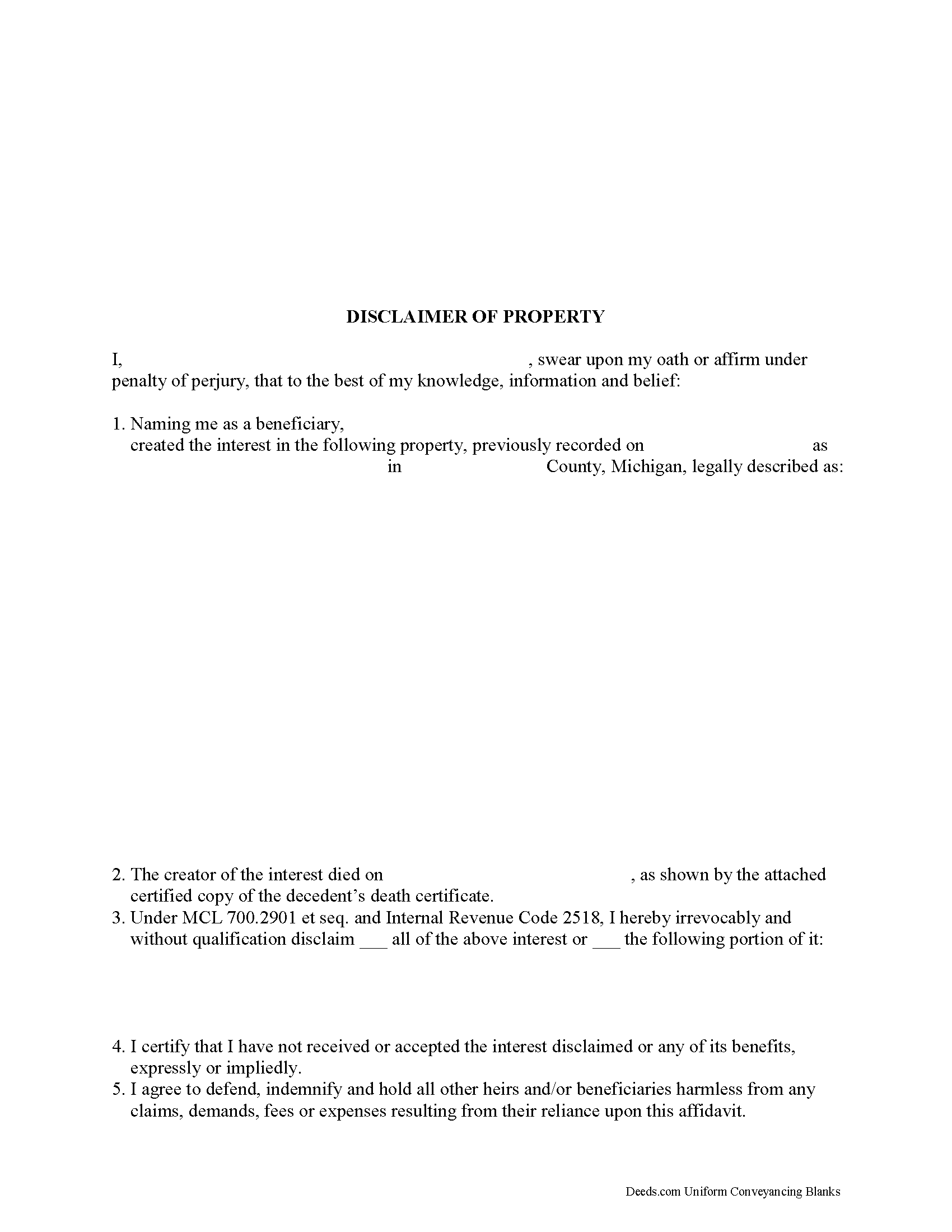
Michigan Disclaimer/Renunciation of Property - Description
A beneficiary of an interest in property in Michigan can disclaim and renounce all or part of a bequeathed interest in, or power over, that property under MCL 700.2902, as long as it has not been accepted through actions that indicate ownership or through a written waiver of the right to disclaim (MCL 700.2910).
The written disclaimer must identify the creator of the interest, provide a description of the disclaimed interest, a declaration of the disclaimer and its extent, and it must be signed by the disclaiming party (MCL 700.2903).
A disclaimer must be delivered in order to be valid, which can be done by mail or in person (MCL700.2906(1)). There is no time limit on this delivery in Michigan statutes, but federal guidelines require that it be received by the transferor, the legal representative, the trustee(s), or the current holder of title within nine months of the transfer (usually the death of the creator). The disclaimer may also be filed with the probate court that would or is going to handle the estate. In the case of real property, it can be recorded with the register of deeds in the county where the pr... More Information about the Michigan Disclaimer of Interest
Certificate of Trust MCL 700.7913
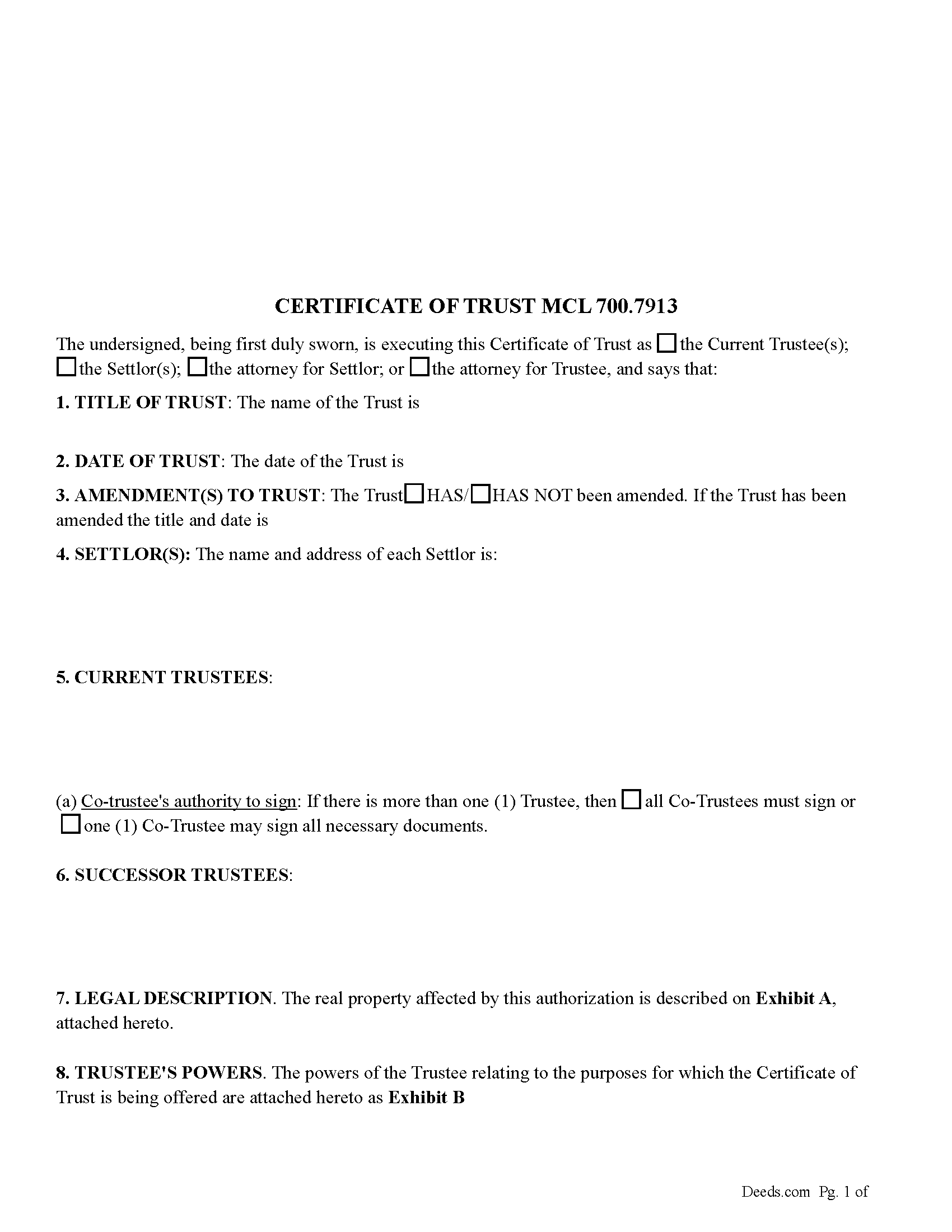
New legislation was signed into law in 2018 that, in essence, consolidated the two types of certificates of trust into one, a (Certificate of Trust) and a (Certificate of Trust Existence and Authority). This Certificate of Trust allows those with an interest in real property the necessary information regarding the Trust to help either fund the Trust or allow real property to be transferred with a clear title. A COT provides pertinent/relevant information needed to satisfy title companies and/or banks. When a Trustee wants to sell real property that is part of a trust, a COT will be required at or before the closing.
Pursuant to the current law, a certificate of trust must include:
The name of the trust, the date of the trust, and the date of each operative trust instrument.
The name and address of each current trustee.
The powers of the trustee relating to the purposes for which the certificate of trust is offered.
The revocability or irrevocability of the trust and the identity of any person holding the power to revoke the trust.
The authority of co-trustees to sign on behalf of the trust or otherwise authenticate on behalf of the trust and whether all or less than all co-... More Information about the Michigan Certificate of Trust MCL 700.7913
Lis Pendens
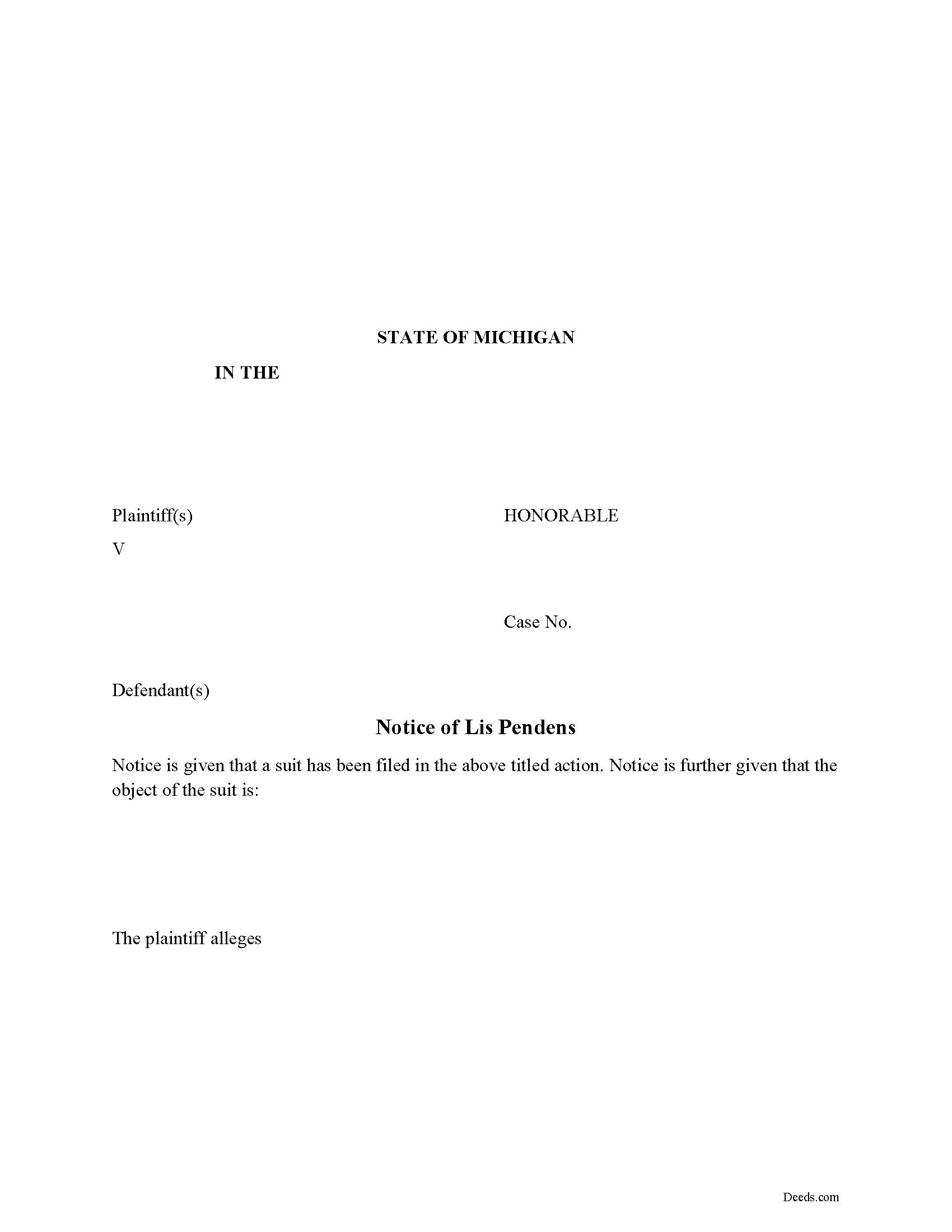
A Notice of Lis Pendens is a document that gives constructive notice of a pending suit to a purchaser of any real estate. The plaintiff files the notice with the register of deeds in counties where affected property are located. A Michigan Lis Pendens contains title and object of cause, legal description of property affected. 600.2701(1)
Typically, a complaint is filed a summons is served, then a Lis Pendens is filed when real property is involved. In Michigan a Lis Pendens can be filed with the complaint before the service of the summons; but, in that case, personal or substituted service of the summons must be made upon a defendant, within 60 days after the filing, or else, before the expiration of the same time, publication must be commenced, or service thereof must be made without the state, as prescribed by law. 600.2701(2)
The register of deeds shall record such notice, in a book kept for that purpose, upon the payment of the fee as is provided by law. A copy of such record, authenticated by the register of deeds, is evidence of such notice, and the recording of the same, in all courts and places. 600.270(3) The Notice once recorded will stay effective for a period of ... More Information about the Michigan Lis Pendens
Lis Pendens Release
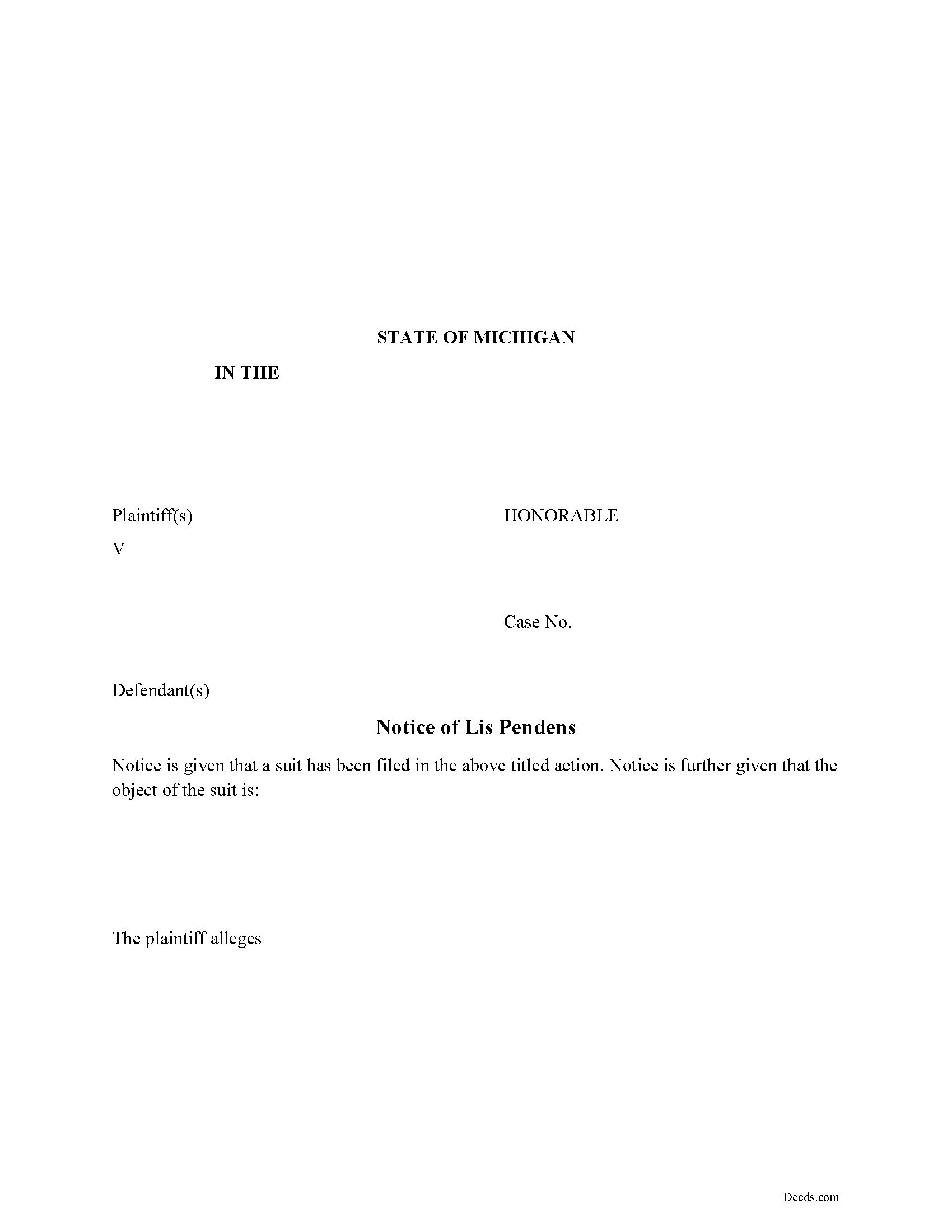
When the case is settled or abandoned it is prudent to release the lis pendens document. A property could be passed over by a buyer because of the existing notice. Damages could then be realized by the seller.
600.2725 Notice lis pendens; cancellation; costs.
(1) If a plaintiff filing the notice before the service of the summons fails to serve the same within the time prescribed in this chapter, or after the action is settled, discontinued or abated, or final judgment is rendered therein against the party filing the notice, and the time to appeal therefrom has expired, the court, upon the application of any person aggrieved and upon such notice as may be directed or approved by it, shall direct that a notice of the pendency of an action be canceled of record by a particular register of deeds, or by all the registers of deeds, with whom it is filed.
(2) If a plaintiff filing the notice unreasonably neglects to proceed in the action, or does not commence or prosecute the action in good faith, the court, in its discretion, upon the application of any person aggrieved and upon such notice as may be directed or approved by it, may direct that a notice of the pendency of an acti... More Information about the Michigan Lis Pendens Release